Georgia Documents
Quitclaim Deed
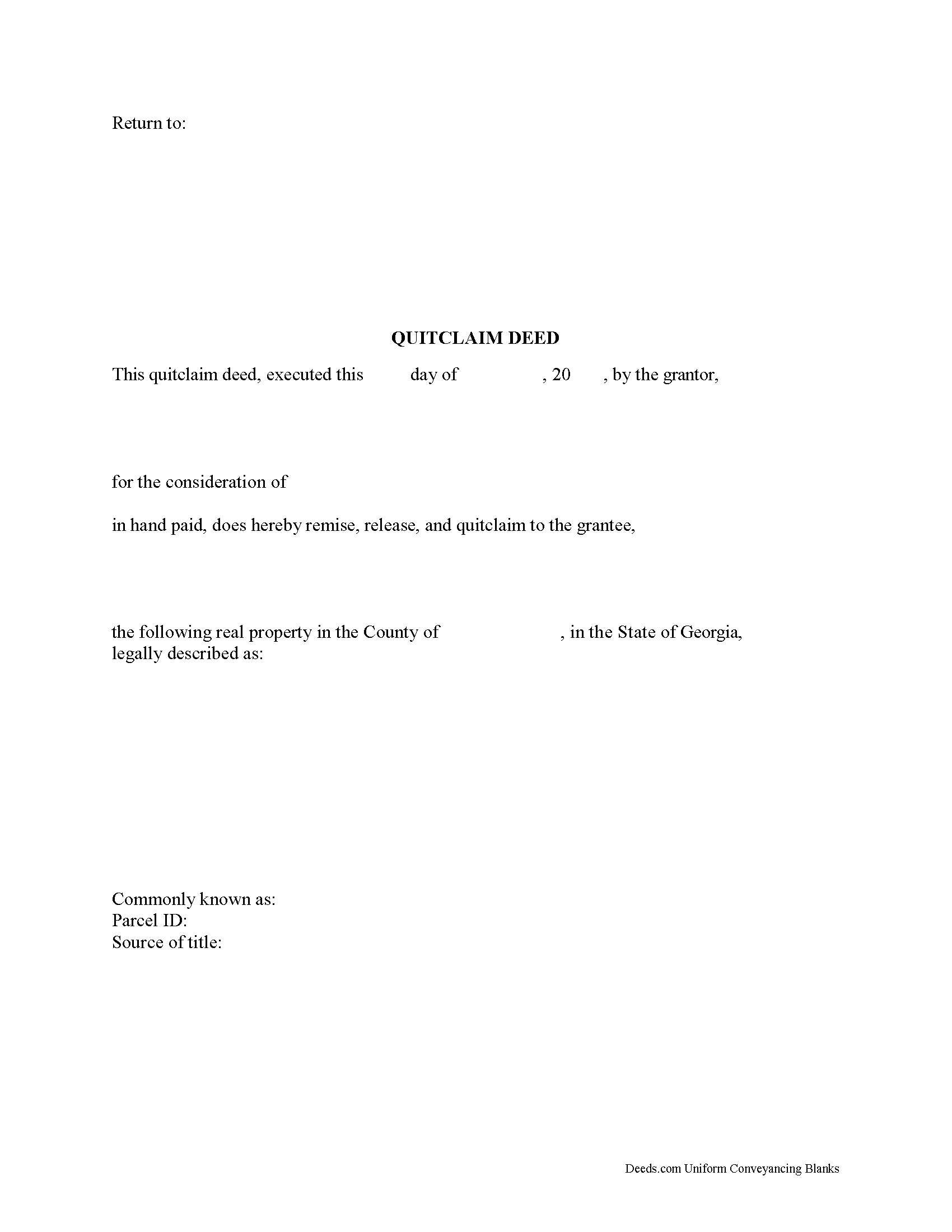
Georgia Quitclaim Deed Form Content:
Quitclaim deeds in Georgia are not specifically defined by statute. In fact, according to O.C.G.A 44-5-33, the deed must merely contain sufficient information to clearly represent the grantor's intention. As such, a heading of "Quitclaim Deed" alerts the recorder or title reviewer to the purpose of the conveyance. Quitclaim deed documents do not contain a guarantee title for the grantee. In fact, O.C.G.A. 44-5-61 declares that there is no implied warranty of title in any deed for land.
O.C.G.A. 44-5-30, provides the minimum requirements for deeds conveying real property, stating that a deed conveying land must be in writing; signed by the grantor; witnessed by two people who are not parties to the quit claim deed---one witness may be the notary or other official who acknowledges the grantor's execution of the document; and information about the consideration (value, usually money) given in exchange for the property. Deeds must also contain a name and return address at the top of the first page. In addition to these requirements, include the following information to ensure clarity of ownership: the full names and addresses of all parties (... More Information about the Georgia Quitclaim Deed
Gift Deed
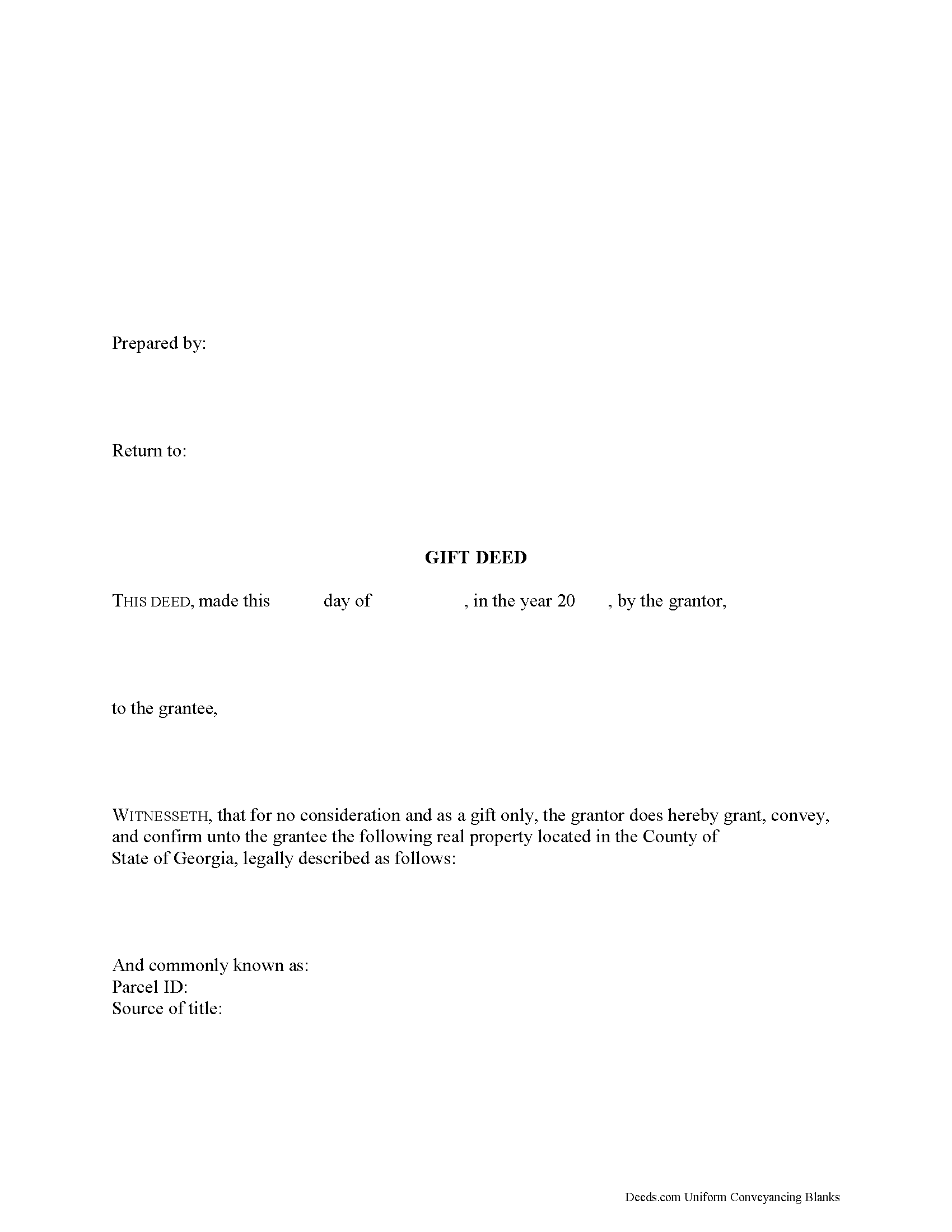
Gifts of Real Property in Georgia
Gift deeds convey title to real property from one party to another with no exchange of consideration, monetary or otherwise. Often used to transfer property between family members or to gift property as a charitable act or donation, these conveyances occur during the grantor's lifetime. Gift deeds must contain language that explicitly states that no consideration is expected or required. Ambiguous language, or references to any type of consideration, can make the gift deed contestable in court.
A lawful gift deed includes the grantor's full name and marital status, as well as the grantee's full name, marital status, vesting information, and mailing address. Vesting describes how the grantee holds title to the property. Generally, real property is owned in either sole ownership or co-ownership. For Georgia residential property, the primary methods for holding title are tenancy in common and joint tenancy. An estate conveyed to two or more people is presumed a tenancy in common, unless otherwise specified (OCGA 44-6-120, 44-6-190).
As with any conveyance of realty, a gift deed requires a complete legal description of the parcel. Recite th... More Information about the Georgia Gift Deed
Warranty Deed
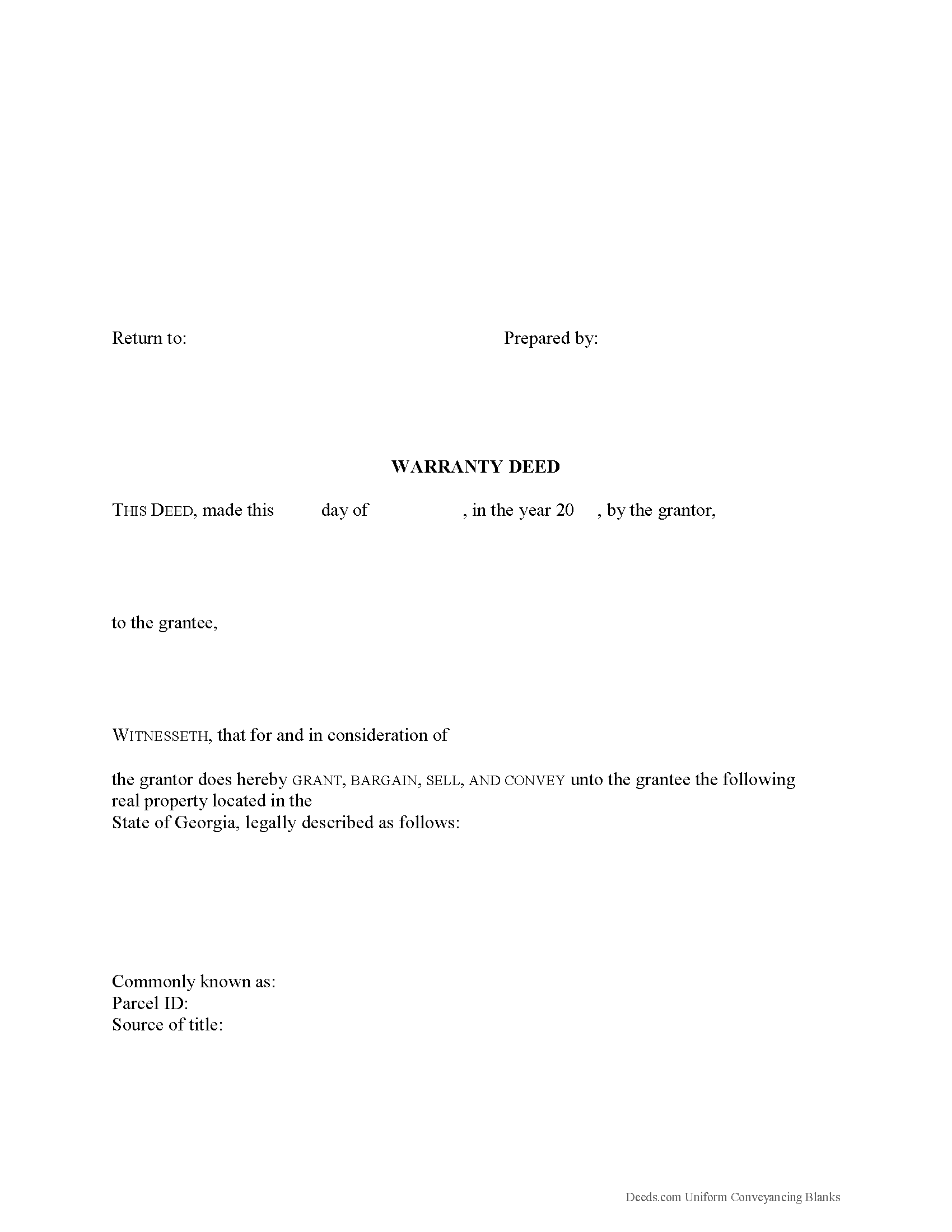
Georgia statutes do not provide a statutory form for a warranty deed; however, if a deed is sufficient in itself to make known the transaction between the parties, no want of form will invalidate it ( 44-5-33). In a warranty deed, a general warranty of title against the claims of all persons includes covenants of a right to sell, of quiet enjoyment, and of freedom from encumbrances ( 44-5-62). In a general warranty deed in Georgia, a general warranty of title against the claims of all persons covers defects in the title, even if they are known to the purchaser at the time he or she takes the deed ( 44-5-63).
Before a deed can be recorded in this state, it must be signed by the grantor and attested or acknowledged as required by law ( 44-2-14). To authorize the recording of a warranty deed executed in a state other than Georgia, it must be attested or acknowledged before one of the officers listed in 44-2-21 and must also be attested by two witnesses, one of whom may be one of the officers taking acknowledgements (44-2-21). If the warranty deed has been executed in Georgia, it may be attested by a judge of a court of record, including a judge of a municipal court, or by a magis... More Information about the Georgia Warranty Deed
Special Warranty Deed
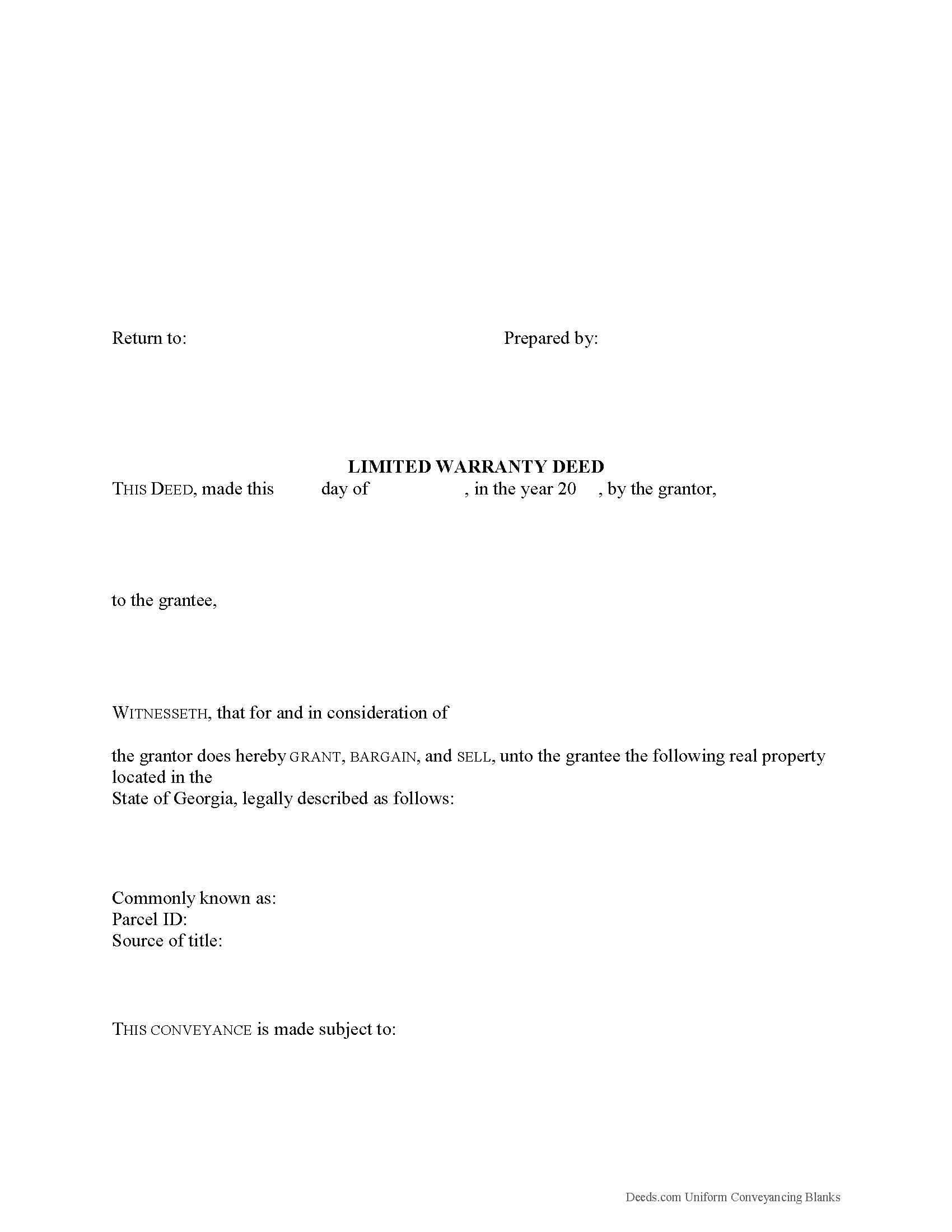
A special warranty deed (limited warranty deed) in Georgia must conform to statutory regulations for conveyances of real estate.
The Georgia Statutes do not provide a form for a special warranty deed. If a deed is sufficient in itself, according to the Georgia Statutes, to make known the transaction between the parties, it will be valid. A deed should be properly labeled as to the type of transaction (i.e. "Special Warranty Deed"). A special warranty deed includes a covenant from the grantor to defend the title against only the claims and demands of the grantor and those claiming or to claim by, through, or under the grantor. There are no implied warranties of title in any deed in this state ( 44-5-61).
A special warranty deed in Georgia must be signed by the grantor and attested or acknowledged as required by law ( 44-2-14). A deed executed in a state other than Georgia can be attested or acknowledged before any of the officers listed in 44-2-21. Special warranty deeds executed out-of-state must also be attested by two witnesses, one of whom may be the officers taking acknowledgments (44-2-21). A special warranty deed executed in Georgia can be attested by a judge of a cou... More Information about the Georgia Special Warranty Deed
Grant Deed
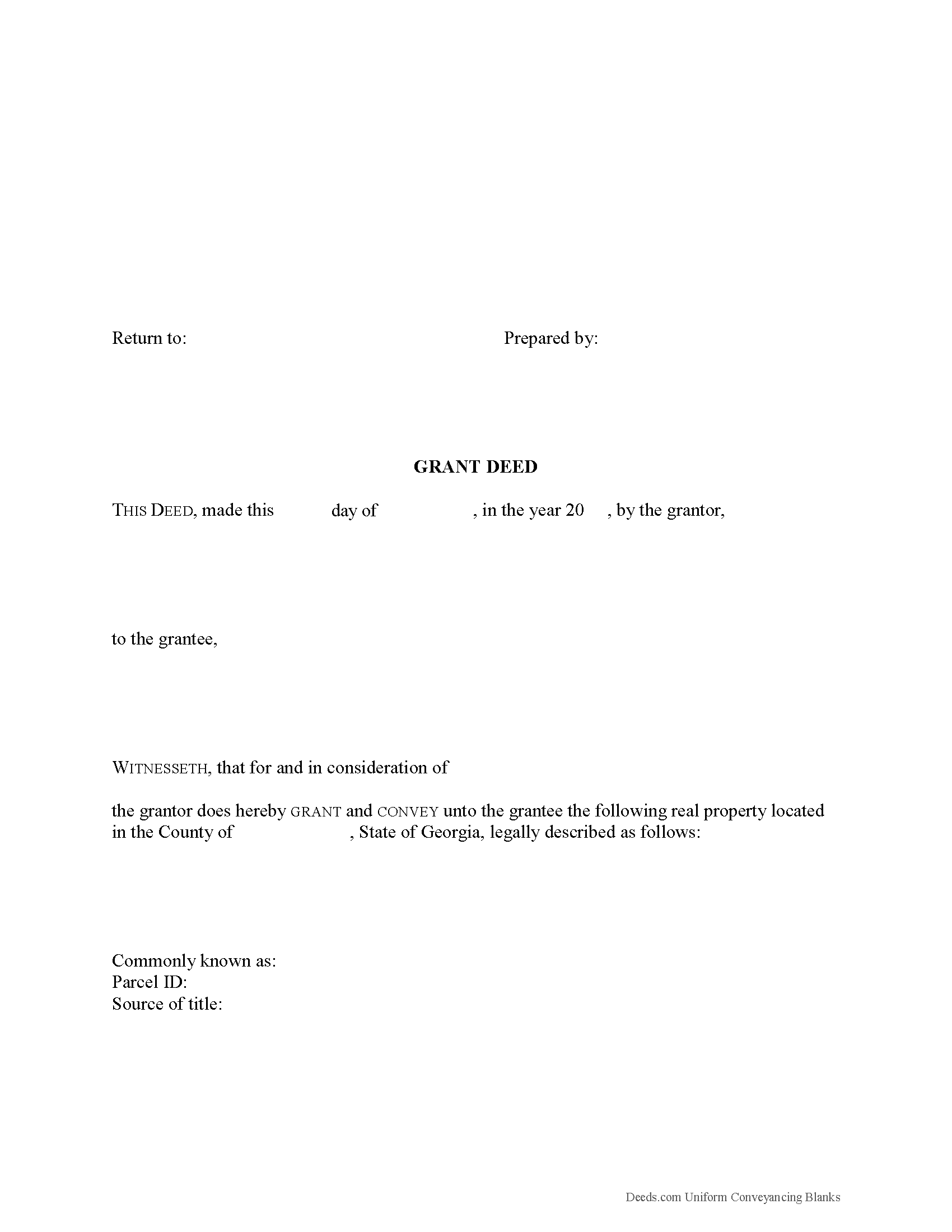
A grant deed is a real estate deed that is used to transfer real property in Georgia from one entity to another. There are no statutory forms provided for a grant deed in Georgia. If a deed sufficiently makes known the transaction between the parties, no want of form will invalidate it ( 44-5-33). In a grant deed, the grantor warrants and forever defends the right and title to the described property unto the grantee and the grantee's heirs and assigns against the claims of all persons owning, holding, and claiming by, through, or under the grantor.
When submitting a grant deed for recordation, it must be an original, signed by the grantor, and should be attested or acknowledged as required by law ( 44-2-14). Grant deeds executed in Georgia may be attested by a judge of a court of record, including a judge of a municipal court, or by a magistrate, a notary public, or a clerk or deputy clerk of a superior court or of a city court created by a special act of the General Assembly. With the exception of notaries public and judges of courts of record, such officers may only attest instruments only in the county in which they respectively hold their offices ( 44-2-15). In order to re... More Information about the Georgia Grant Deed
Correction Deed
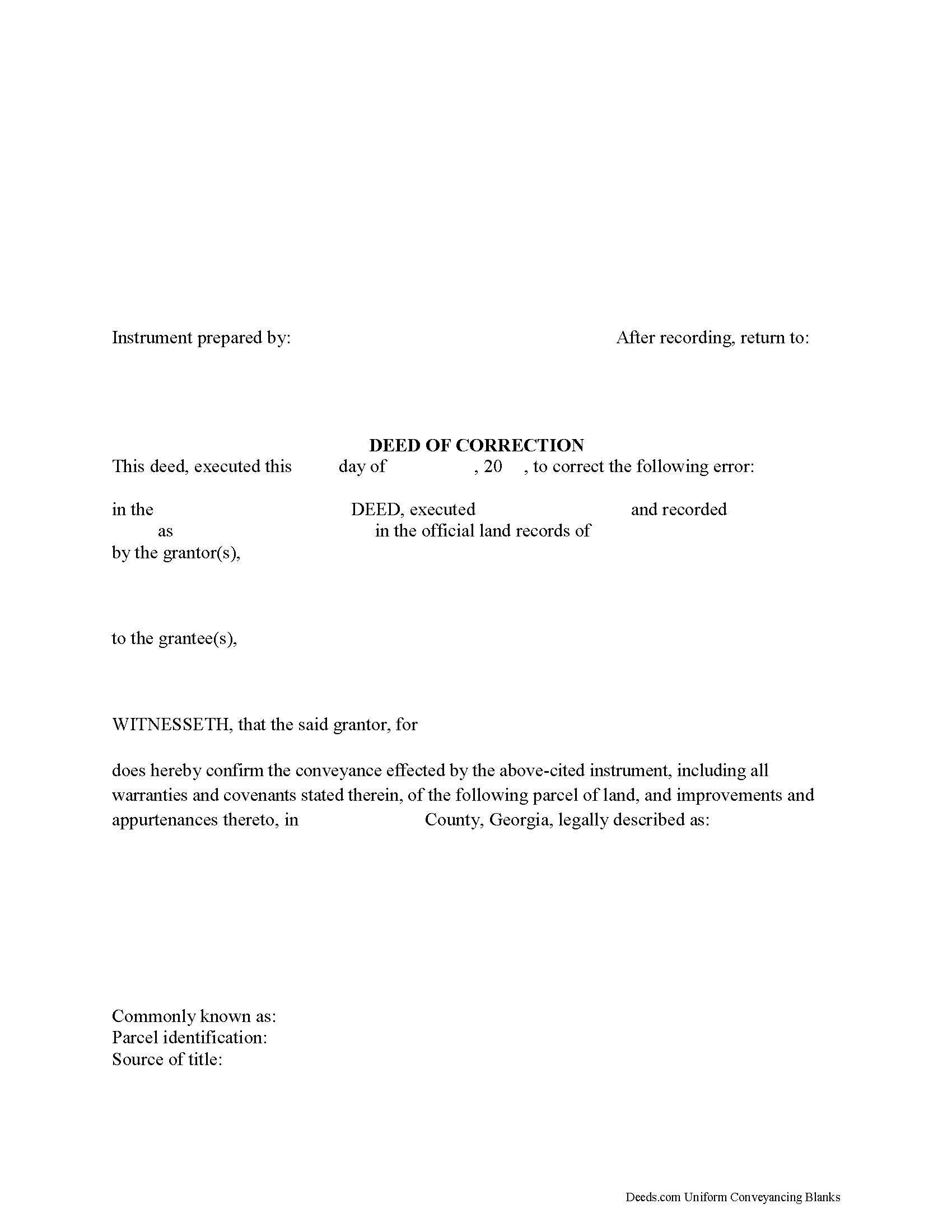
Use this correction deed to correct an error in a previously executed and recorded deed.
Correction deeds are used to adjust the earlier deed when that document contains minor errors of omission or typographical errors, sometimes called scrivener's mistakes. For example, a misspelled name, an omitted or wrong middle initial, a minor error in the property description, or an omitted execution date.
The correction deed, also called deed of correction or deed of confirmation, must state that its sole purpose is to correct a specific error, which is usually identified by type. For example: an error in the grantor's name, or an error in the grantor's marital status.
Once the correction deed is recorded, it will relate back to the date of the original deed. So it is not necessarily a good idea to re-execute the original deed or to execute and record a different type of deed, such as a quitclaim deed, to correct an error. Both of these cannot relate back to the date of the original deed that needs to be corrected. Only the deed of correction is so closely linked to the prior document that all corrections are effective as of the date of the original recorded instrument.
(Georgia... More Information about the Georgia Correction Deed
Easement Deed
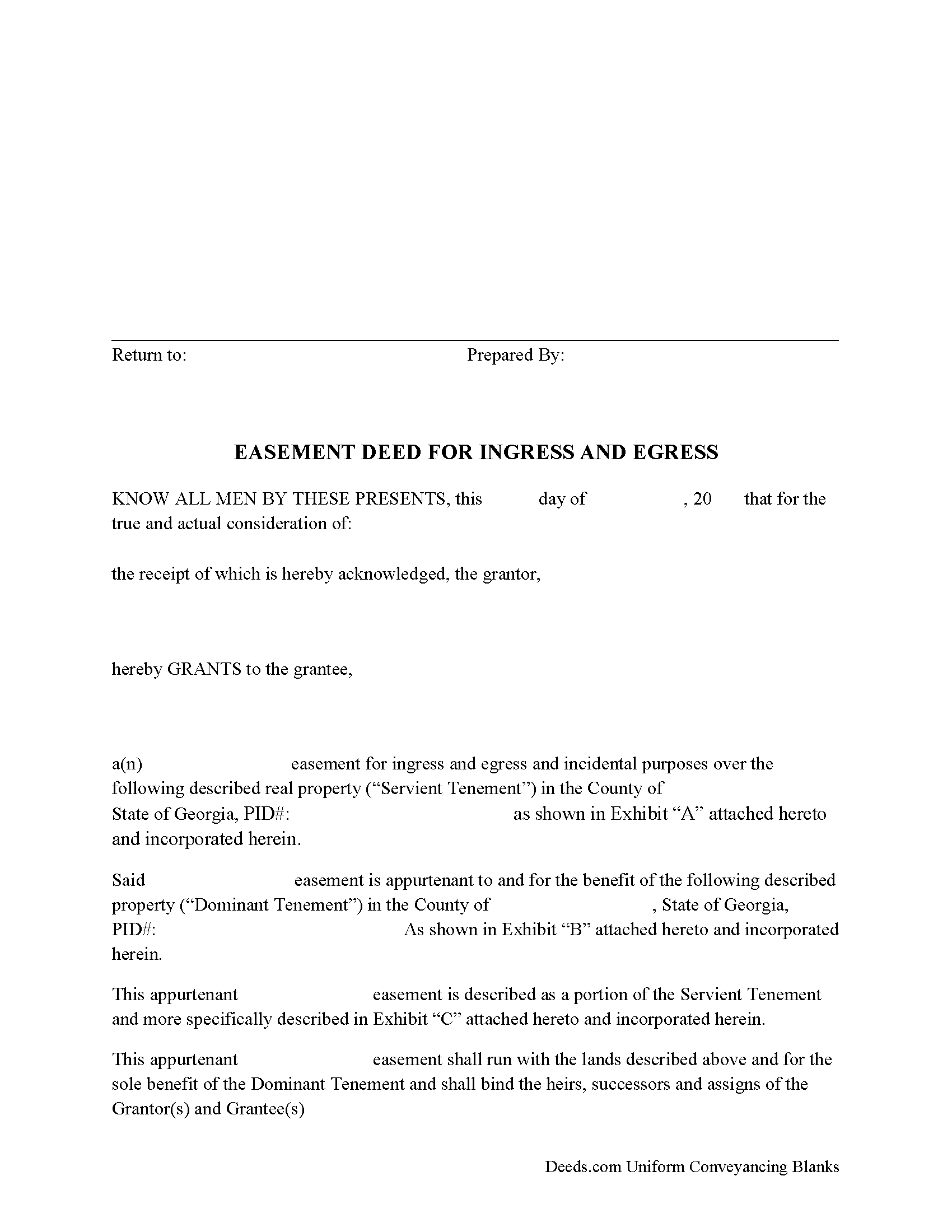
An easement can be created by conveyance in a deed. An easement is the right to use another person's real property for a specific purpose, and the easement deed is the instrument that creates this right. An easement in Georgia can be used for many purposes, including for granting the right of a private way over another's land, for the acquisition of light and air, or for boundary line agreements. Most easements will run with the land being conveyed. Additionally, an easement may be lost or forfeited by nonuse if the abandonment or nonuse continues long enough to raise the presumption of release or abandonment ( 44-9-6). An easement deed is subject to the same formalities as any other transfer of other interests in land in Georgia.
In order to be recordable, an easement deed must be signed by the grantor and must contain two witnesses, one of whom must be the notary with his seal attached. If one of the witnesses is not a notary, then there must be an acknowledgment by a notary attached to the deed ( 44-2-21 and 44-2-14). This pertains to easement deeds executed in Georgia as well as in other states. To authorize the recording of an easement deed executed in a state outside of G... More Information about the Georgia Easement Deed
Termination, Cancellation of Easement / Right of Way
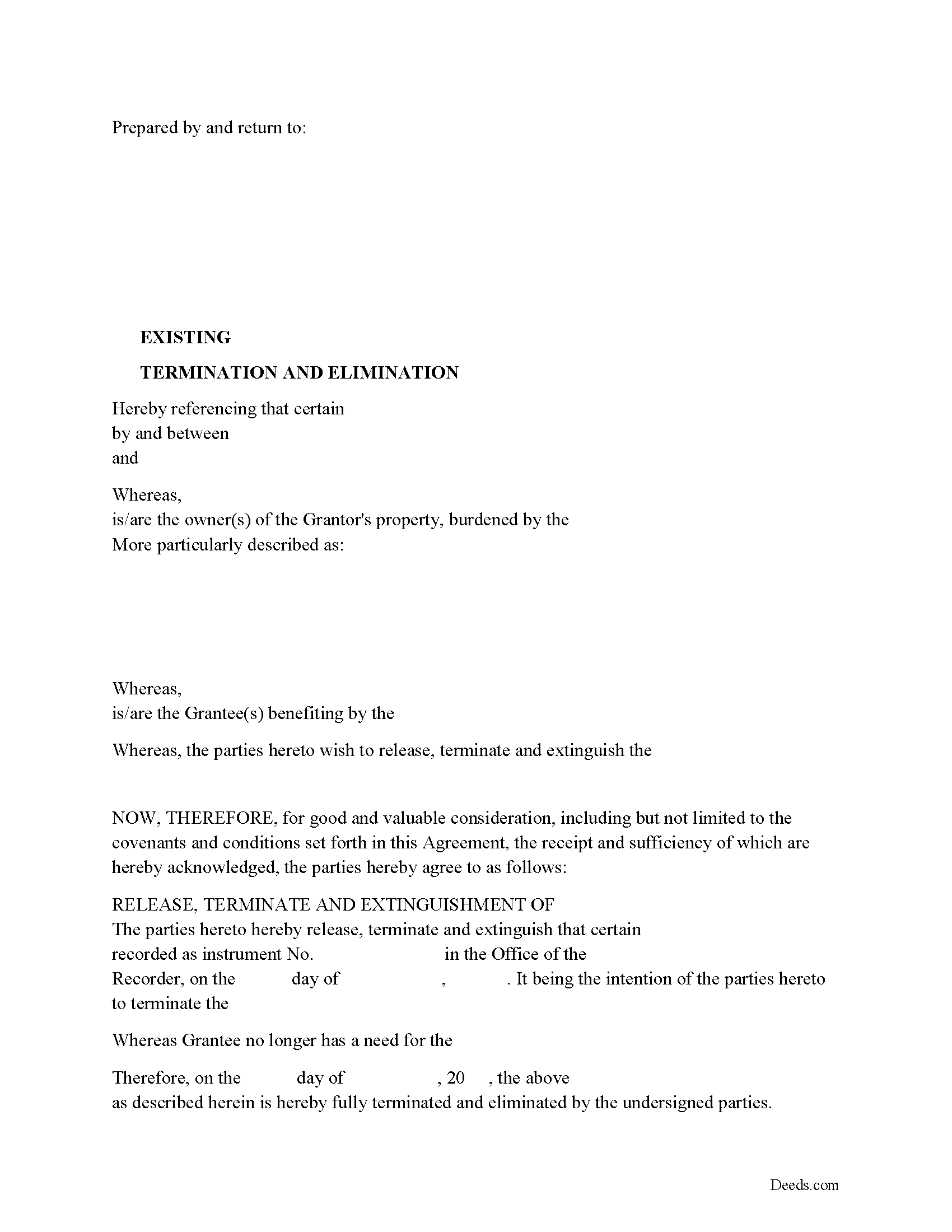
Use this form to release, terminate, extinguish a previously recorded document that involves access to and from a property.
Documents such as:
1. Easement Deeds or Agreements (An easement is a non-possessory interest in land, granting the right to use someone else's property for a specific purpose, like a driveway or utility line)
2. Access Roads
3. Right of Ways
4. Utility Easements (Power, Gas, Water, Sewer, Etc.)
5. Drainage Easements
This document allows the owner of the land, burdened by the access and the party that benefits from the access, to sign an agreement releasing the property from such access, ... More Information about the Georgia Termination, Cancellation of Easement / Right of Way
Mineral Deed
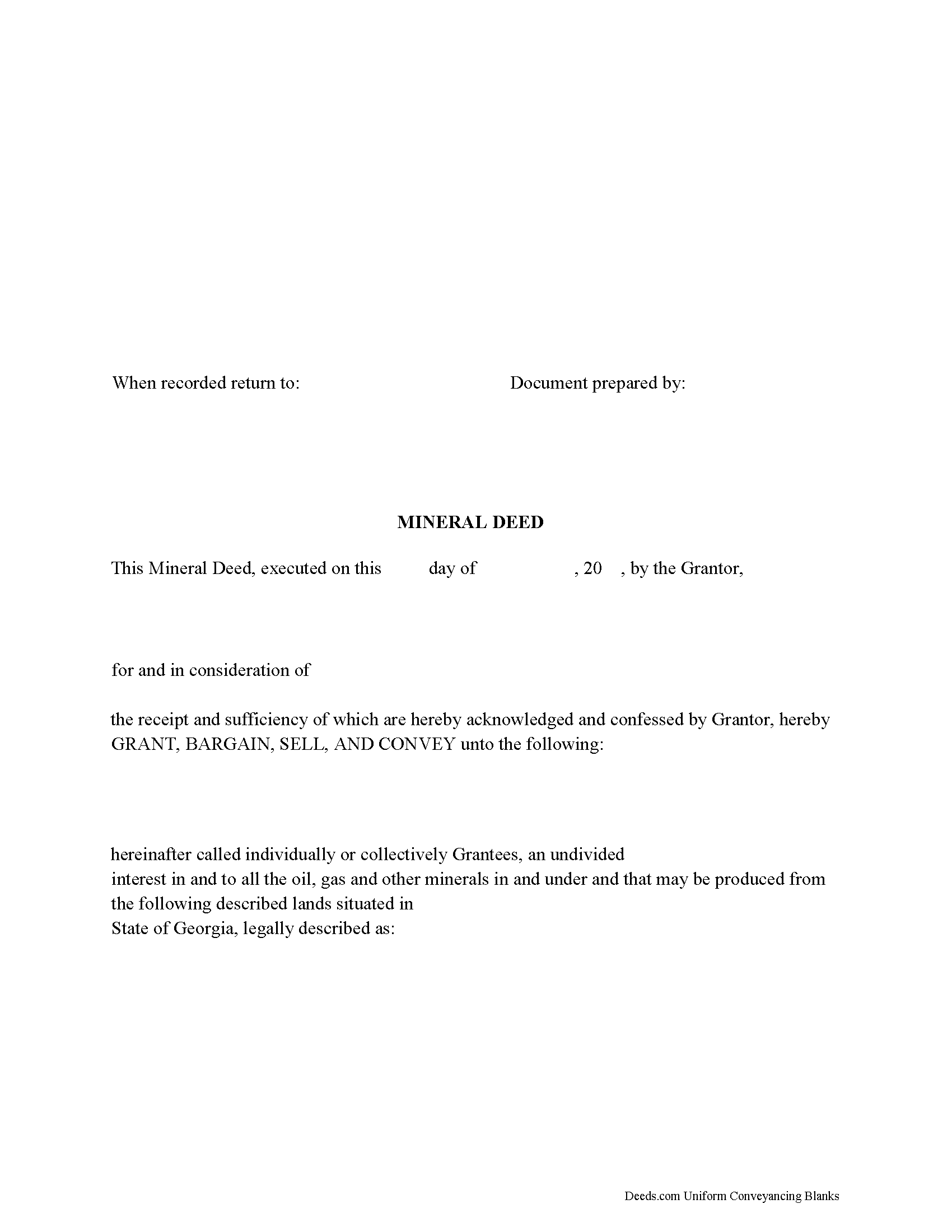
The General Mineral Deed in Georgia transfers oil, gas, and mineral rights from the grantor to the grantee. THIS IS NOT A LEASE. There are no Exceptions or Reservations included.
The transfer includes the oil, gas and other minerals of every kind and nature. It also transfers any and all rights to receive royalties, overriding royalties, net profits interests or other payments out of or with respect to those oil, gas and other minerals. The Grantor can stipulate the percentage of Mineral Rights the Grantee will receive and is made subject to any rights existing under any valid and subsisting oil and gas lease or leases of record.
This general mineral deed gives the grantee the right to access, for the purpose of mining, drilling, exploring, operating and developing said lands for oil, gas, and other minerals, and storing handling, transporting and marketing of such.
In this document the Grantor Warrants and will defend said Title to Grantee. Use of this document has a permanent effect on your rights to the property, if you are not completely sure of what you are executing seek the advice of a legal professional.
(Georgia Mineral Deed Package includes form, guidelines, a... More Information about the Georgia Mineral Deed
Mineral Deed with Quitclaim Covenants
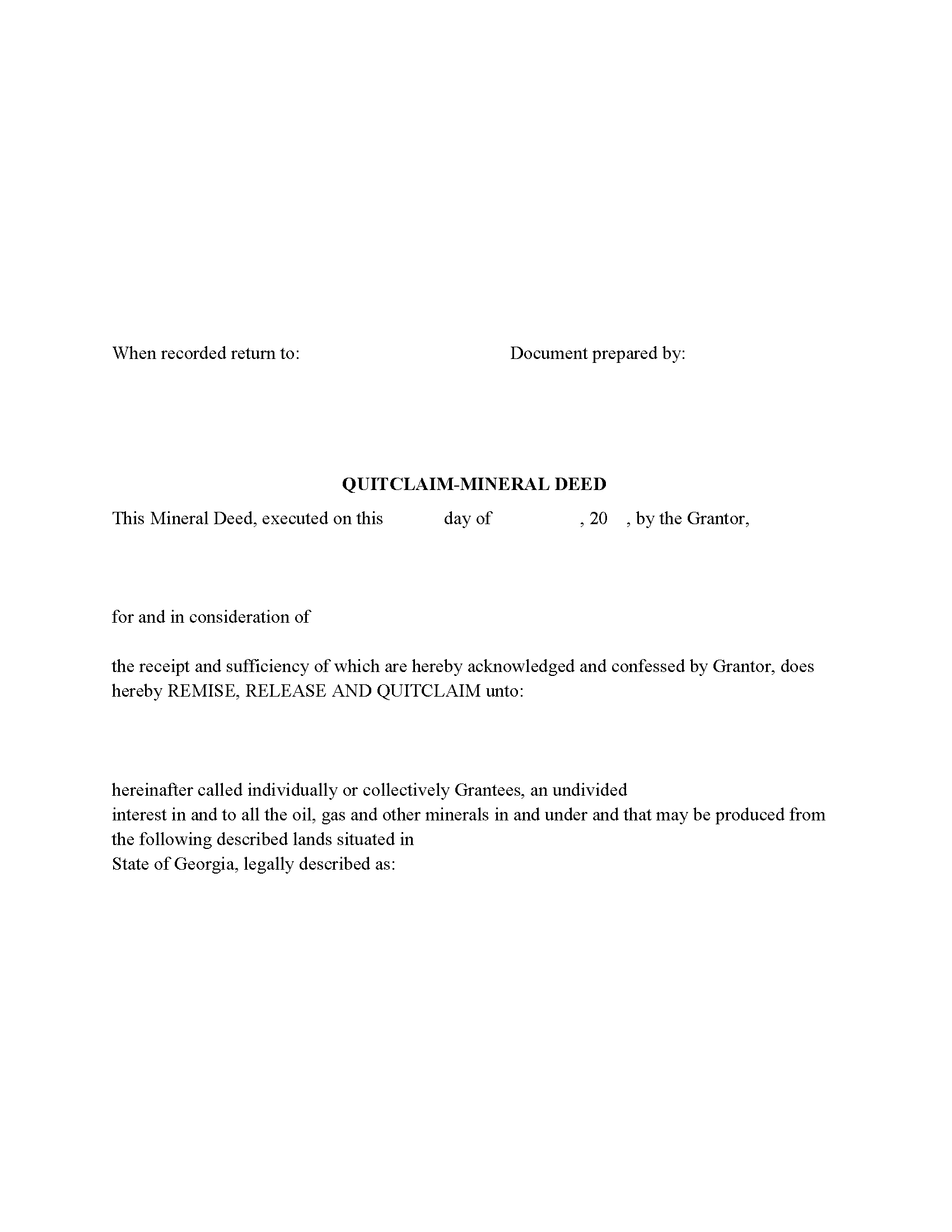
The General Mineral Deed in Georgia Quitclaims oil, gas, and mineral rights from the grantor to the grantee. THIS IS NOT A LEASE. There are no Exceptions or Reservations included.
The transfer includes the oil, gas and other minerals of every kind and nature. The Grantor can stipulate the percentage of Mineral Rights the Grantee will receive.
This general mineral deed gives the grantee the right to access, for the purpose of mining, drilling, exploring, operating and developing said lands for oil, gas, and other minerals, and storing handling, transporting and marketing of such.
The seller, or grantor Quitclaims the mineral rights and does NOT accept responsibility to any discrepancy of title (This assignment is without warranty of title, either express or implied)
Uses: Mineral deeds with quitclaim are often used in situations where the grantor wants to quickly release any interest they might have in mineral rights, such as in settling estates, resolving disputes, clearing up uncertainties about ownership in a title's history or when mineral rights have previously been severed or fragmented from surface rights and cloud a title, making it difficult to transfer property... More Information about the Georgia Mineral Deed with Quitclaim Covenants
Trustee Deed
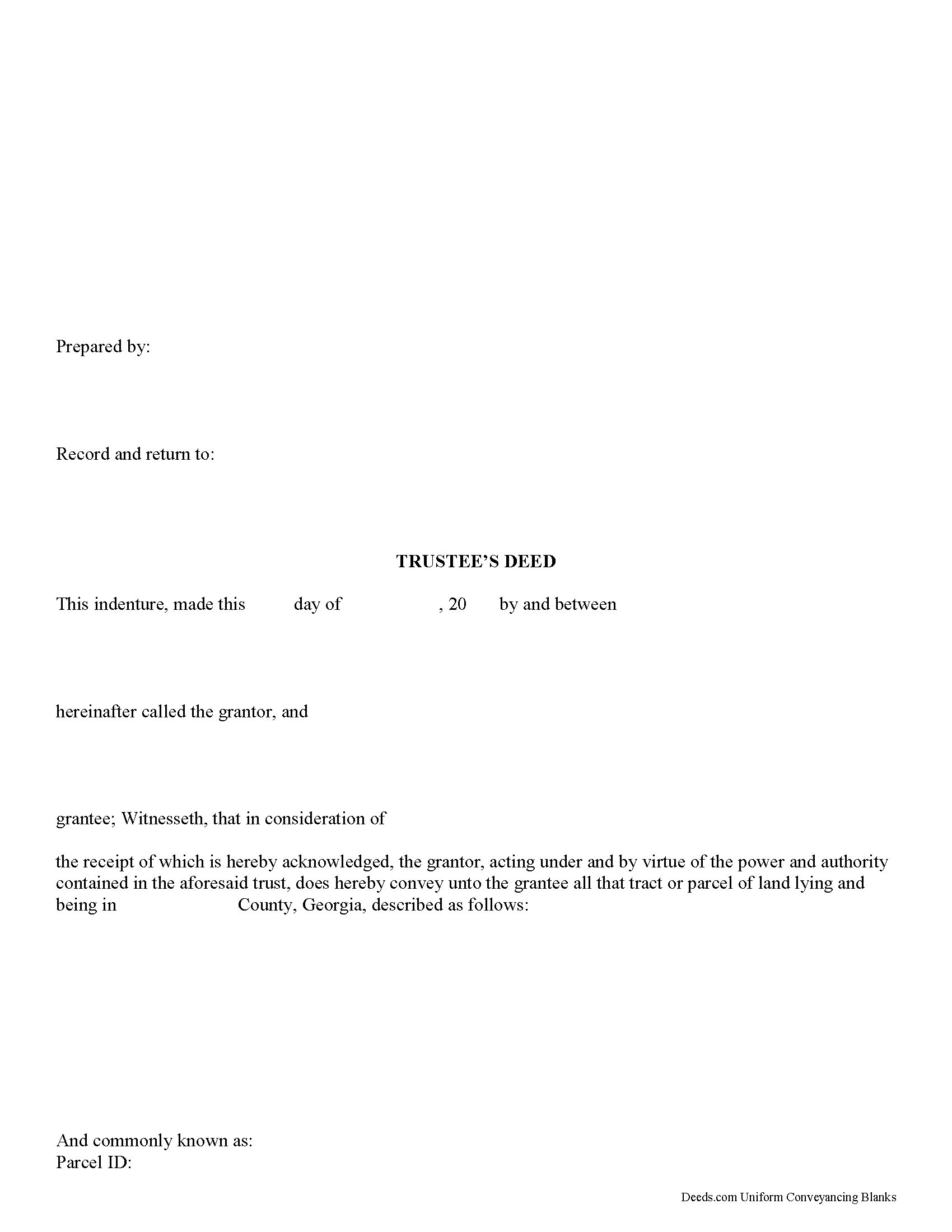
A trustee's deed is an instrument of trust administration used by a trustee to convey real property out of a trust.
A trust is created by a settlor, who funds the trust with real and/or personal property for estate planning purposes. Since a trust is not a person and cannot hold title, when the settlor transfers real property into the trust, title to the property is vested in the name of the trustee. The trustee manages the trust's assets according to the directions set out in the trust document, often for the benefit of a third party, called a beneficiary.
There is no statutory form for conveyances in Georgia, so long as the transfer between parties is clear (O.C.G.A. 44-5-33). A valid trustee's deed names the trustee as the grantor and provides basic information about the trust under which the trustee is acting, including the name and date of the trust. The settlor is not involved in the transfer. However, a certificate of trust is sometimes included, which names the original settlor of the trust, verifies the trust's existence and the trustee's authority to act on its behalf, and confirms the power of sale that the trustee has under the trust.
In Georgia, the basic t... More Information about the Georgia Trustee Deed
Assent to Devise
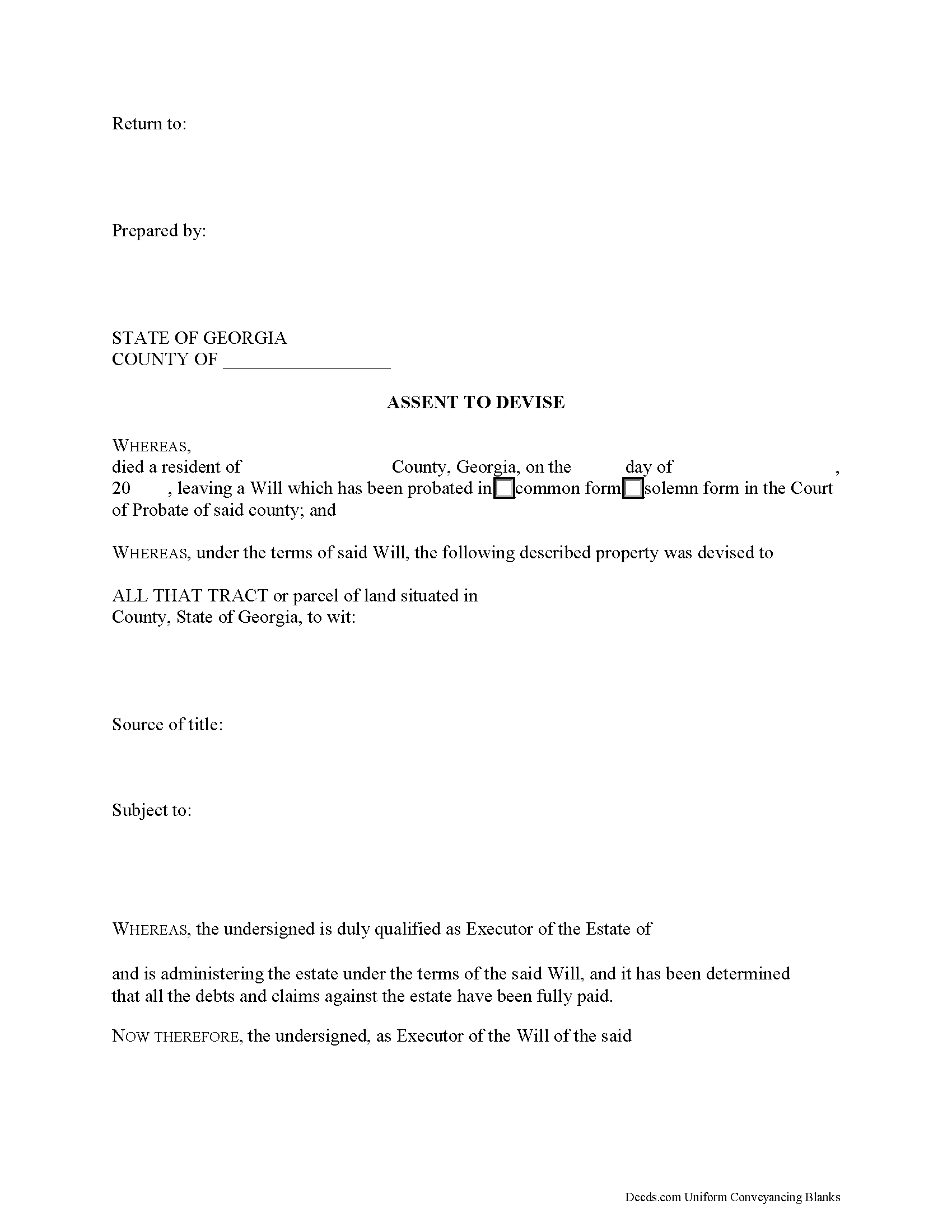
Commonly, when people create their wills, they identify one or more individuals to supervise the distribution of their assets. The person who fills this role is called an executor. An executor uses an assent to devise to transfer real property from the decedent's estate to beneficiaries named in the decedent's will.
Under Georgia law, "title to property in the estate does not pass to the heirs or beneficiaries until the personal representative assents thereto" (OCGA 53-8-15).
Record the completed assent to devise, along with any necessary supporting documents, with the real property records of the appropriate county. This shows that the executor assents to the passing of title from the decedent to the beneficiary.
Consult an attorney with questions about the assent to devise form, or with any other issues related to probate in Georgia.
(Georgia Assent to Devise Package includes form, guidelines, and completed example)... More Information about the Georgia Assent to Devise
Executor Deed
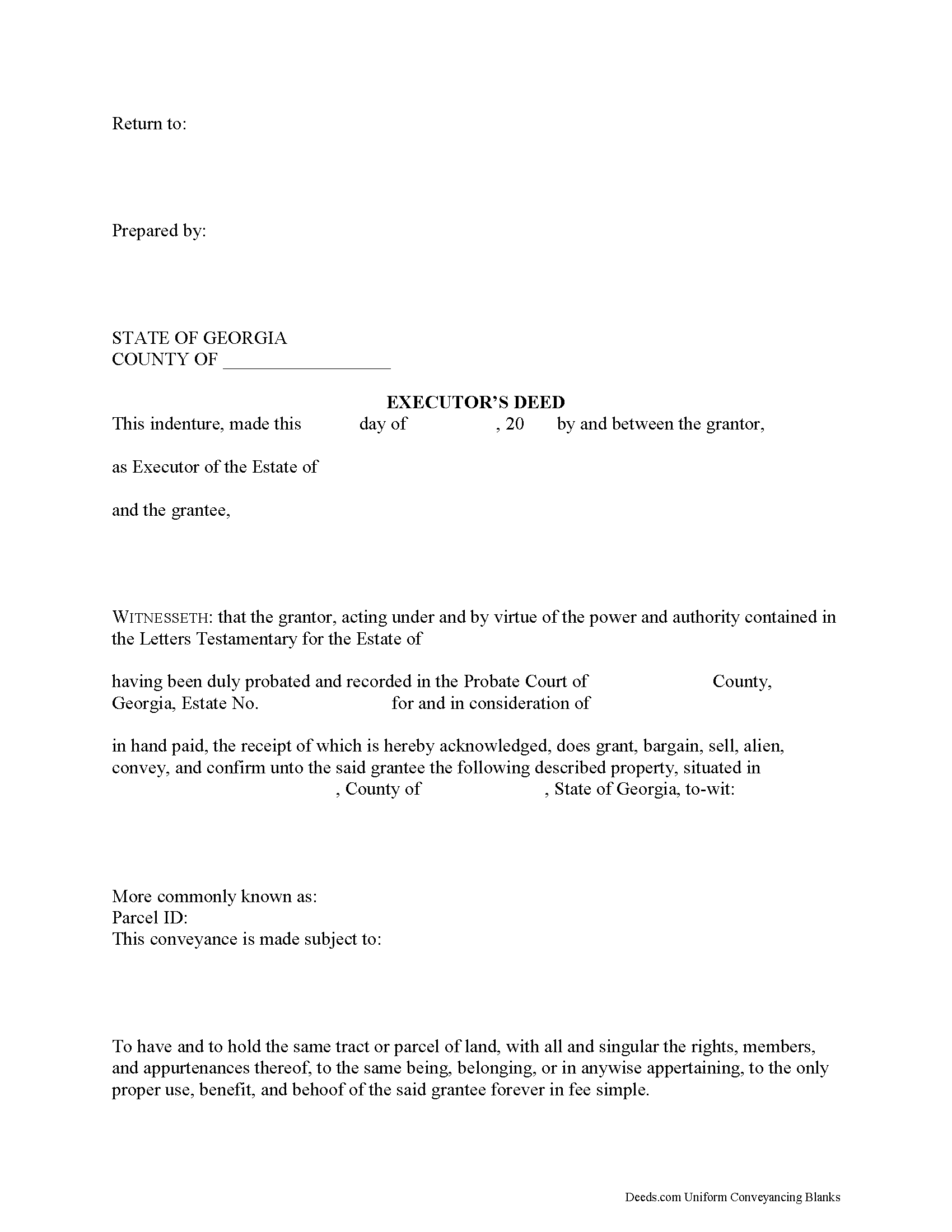
When people create their wills, they generally name one or more individuals to supervise the distribution of their assets. Georgia customarily uses the term "personal representative" to refer to both executors and administrators, but get more specific when it comes to conveying title to real estate. An executor is a personal representative designated in a will to manage a testate decedent's estate; an administrator is appointed by the probate court, and can be involved in either testate or intestate (without a will) processes.
During probate, the court may direct an executor to sell real property pursuant to the terms of the decedent's will, to pay the estate's debts, or to consolidate the decedent's estate for devise among multiple beneficiaries. The named personal representative uses an executor's deed to transfer real property from a testate estate. The executor's deed contains all the information required for a standard conveyance, such as a quitclaim or warranty deed, but also includes relevant details about the decedent and the probate case.
To transfer title to a buyer, record the completed executor's deed, along with any necessary supporting documents, with the real p... More Information about the Georgia Executor Deed
Administrator Deed
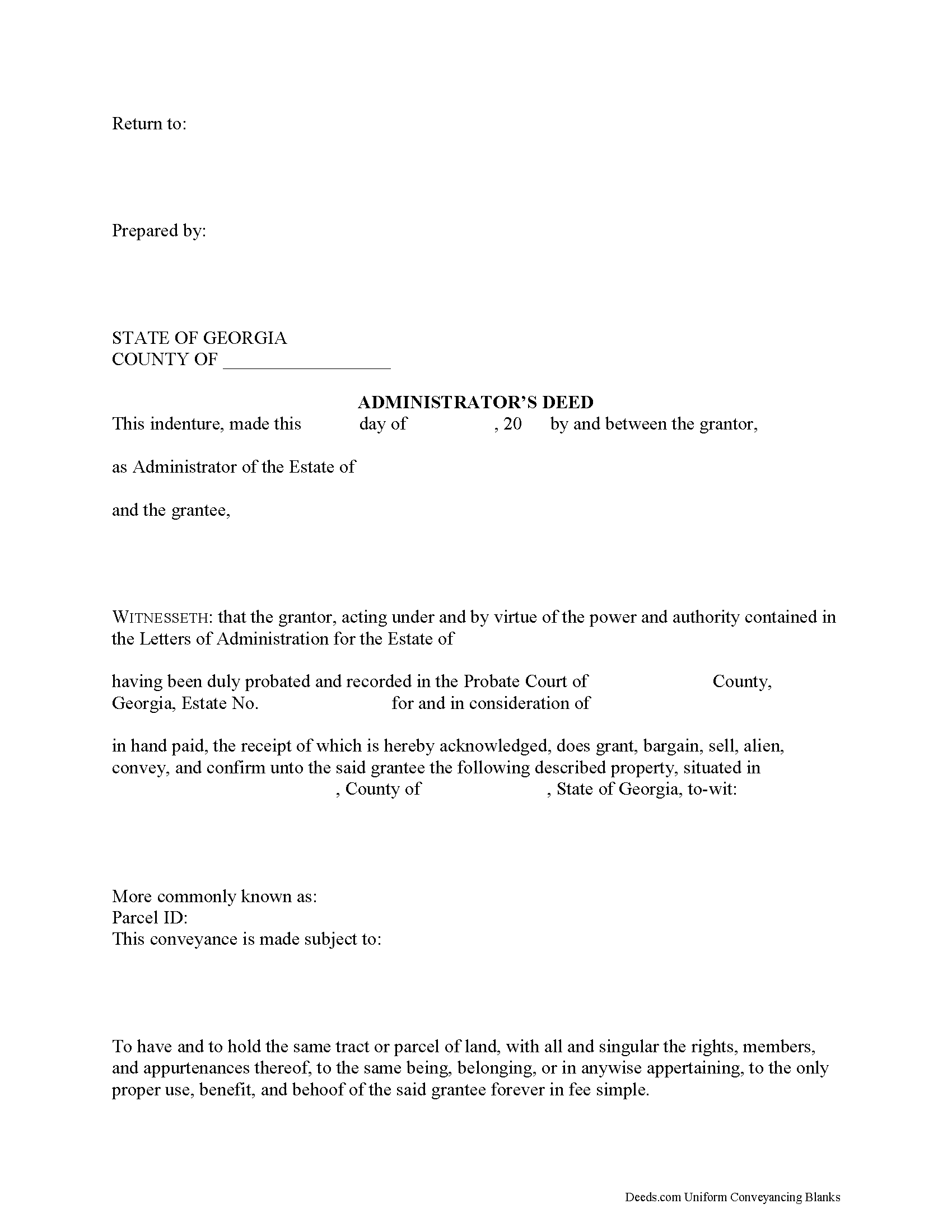
When people create their wills, they generally name one or more individuals to supervise the distribution of their assets. The person who fills this role is called an executor. Sometimes, though, the chosen executor is unable, unfit, or unwilling to accept the responsibility. In other situations, the deceased dies intestate (without a will). No matter the reason, if there is no executor, the probate court will appoint an administrator to manage the probate estate.
Georgia customarily uses the term "personal representative" to refer to both executors and administrators, but can get more specific when it comes to conveying title to real estate. During probate, the court may direct an administrator to sell real property to pay the estate's debts or to consolidate the decedent's assets for distribution to any heirs.
An administrator's deed, executed by the appointed personal representative, includes relevant information about the decedent and the probate case, in addition to the state and local requirements. To transfer title to a buyer, record the completed administrator's deed, along with any necessary supporting documents, with the real property records of the appropriate co... More Information about the Georgia Administrator Deed
Preliminary Notice of Mechanics Lien
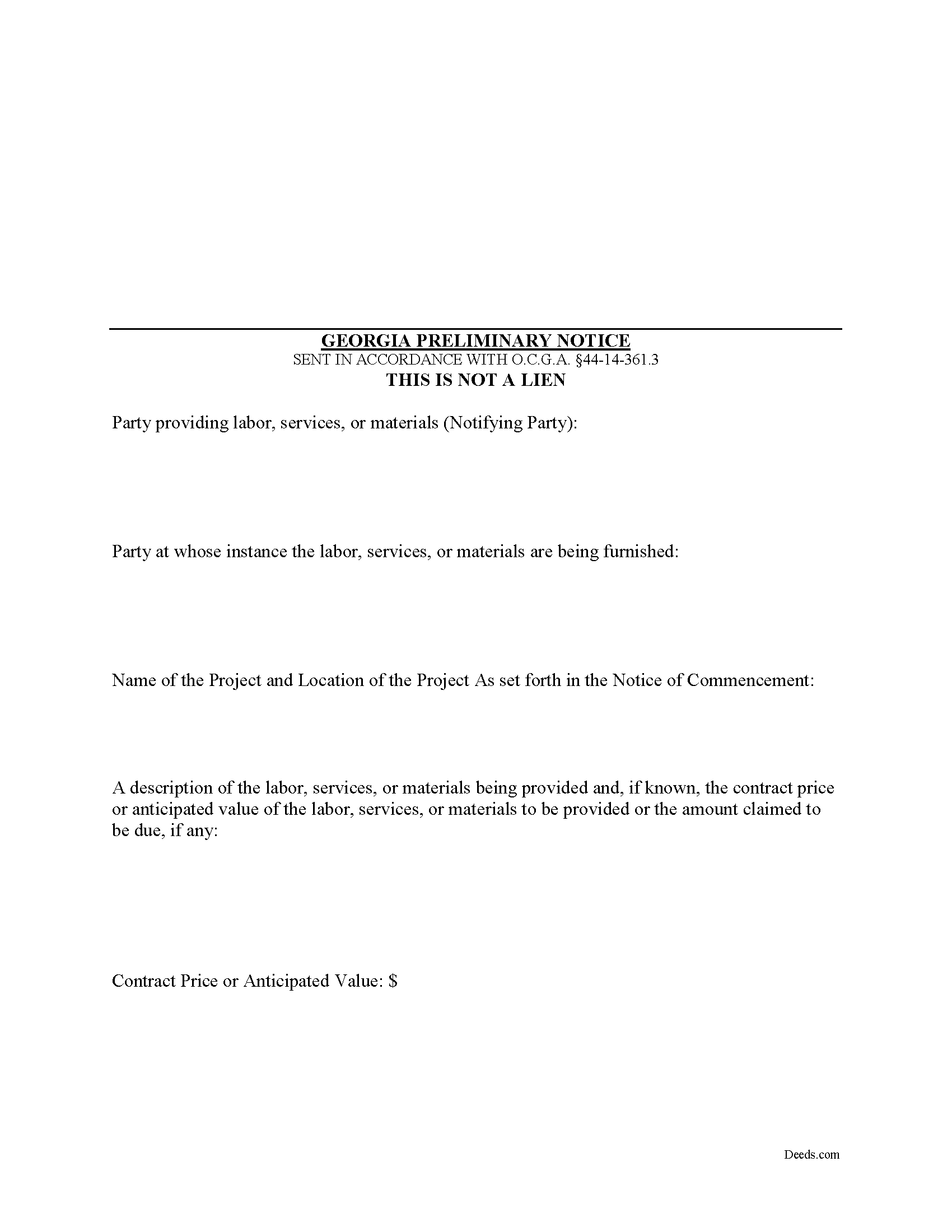
Georgia Mechanic's Lien on your mind? First file your preliminary notice!
In many states, claimants must file a document known as a "preliminary" or "pre-lien" notice as a prerequisite to securing mechanic's lien rights. Georgia does not adhere to this requirement, so forgetting to file preliminary notice won't cost the claimant's lien rights. Under Georgia law, however, a person with a lien right may, at his or her option, file a preliminary notice. O.G.C.A. 44-14-361.3.
Preliminary notices are used by subcontractors and material suppliers who are not under a direct contract with the owner. A preliminary notice form follows a simple format that must include: (1) the name, address, and telephone number of the potential lien claimant; (2) the name and address of the contractor or other person at whose instance the labor, services, or materials were furnished; (3) the name of the owner of the real estate and include a description sufficient to identify the real estate against which the lien is or may be claimed; and (4) include a general description of the labor, services, or materials furnished or to be furnished. O.G.C.A. 44-14-361.3(a)(2)---(5).
The preliminary notice of ... More Information about the Georgia Preliminary Notice of Mechanics Lien
Claim of Mechanics Lien
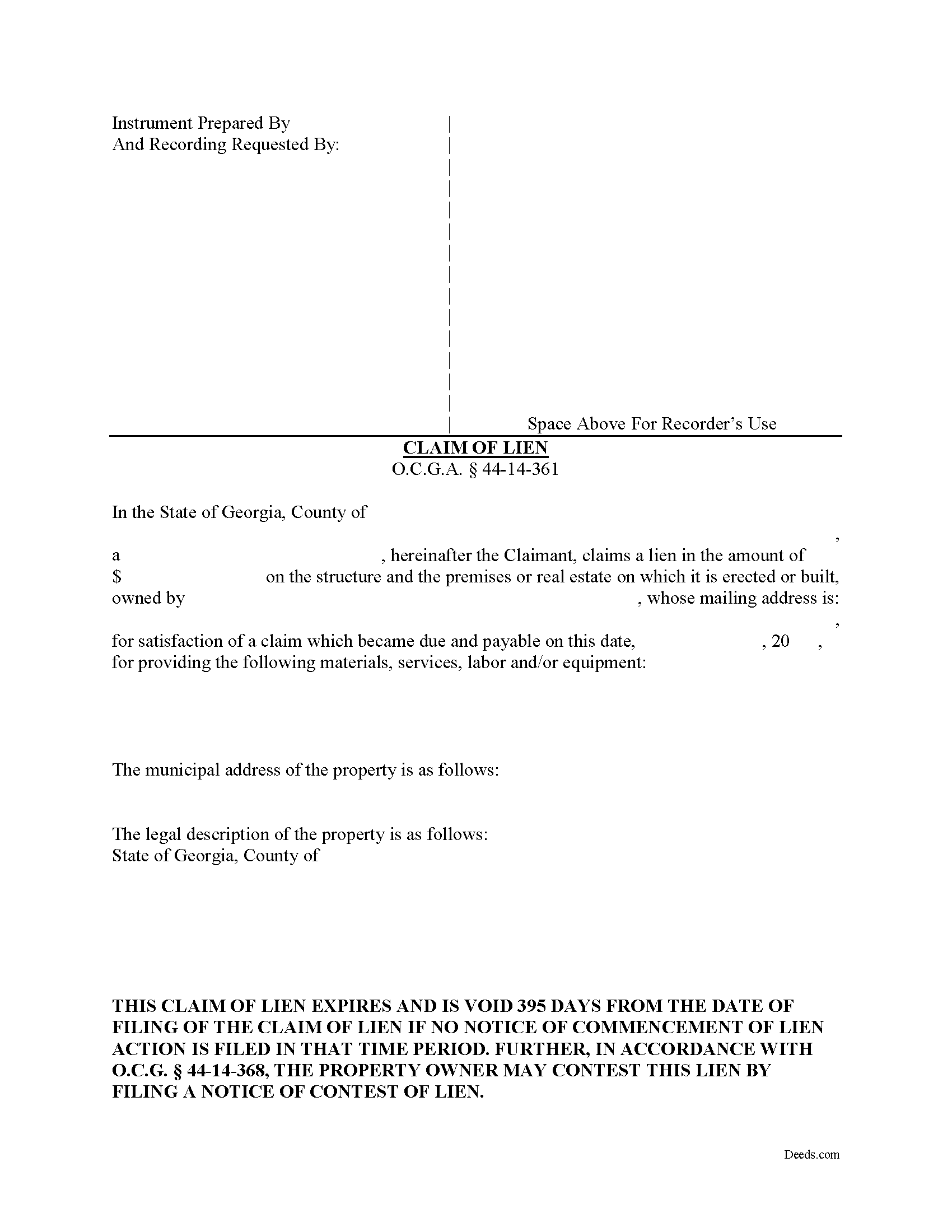
Claiming a Mechanic's Lien in Georgia
Mechanic's liens provide security of payment to builders, contractors, and other parties on a construction job. Suppliers of materials, subcontractors and persons delivering materials can also claim a lien. Liens cover building repairs as well. A mechanic's lien works by making it harder for the owner to sell or refinance the property without first paying off the underlying lien. It also gives the person holding the lien the right to foreclose, or force a sale of the property to recover the money owed.
A mechanic's lien is available in Georgia for contractors, subcontractors, materials suppliers, and laborers to recover on past-due accounts for work or materials furnished. O.G.C.A. 44-14-361.1(a)(1). Use caution when filing a mechanic's lien, as the law contains many traps for the unwary. Carefully compute dates and make sure to file all the required preliminary notices, follow all requirements for content and format, and pay the proper recording fees. The form must be notarized as well.
The lien claim should include the following information: 1) the lien claimant's name and address; 2) the claimed lien amount; 3) property owner's n... More Information about the Georgia Claim of Mechanics Lien
Notice of Contest of Lien
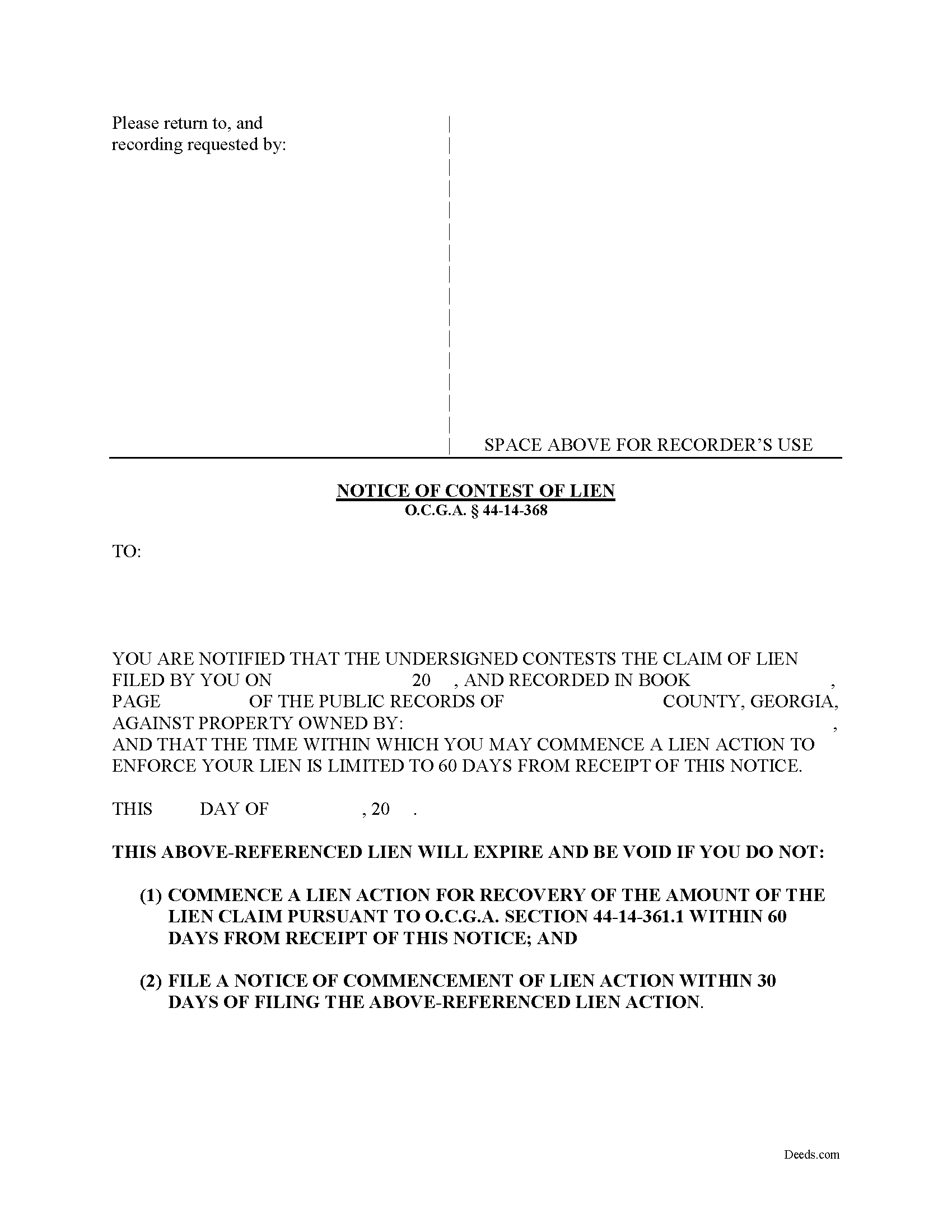
How to Contest a Recorded Claim of Lien in Georgia
In the State of Georgia, an action to enforce a recorded claim of lien must be commenced within 365 days of recording the lien claim. O.C.G.A. 44-14-361.1(a)(3). In addition, within 30 days after commencing such lien action, the party claiming the lien must file a notice of the action with the clerk of the superior court of the county where the subject lien was filed. Id.
Many states, including Georgia, provide the property owner with a method to protect his or her property by allowing the owner to file a notice shortening the time for filing an enforcement action. In Georgia, that procedure is called a "Notice of Contest of Lien." O.C.G.A. 44-14-368.
Under this process, an owner or an owner's agent or attorney, or the contractor or contractor's agent or attorney, may elect to shorten the time set in which to commence a lien action to enforce any claim of lien by recording in the superior court clerk's office a notice of contest, along with proof of delivery upon the lien claimant. O.C.G.A. 44-14-368(a). The notice should contain the lien claimant's name and address, the date the lien claim was filed, the recorded lien ... More Information about the Georgia Notice of Contest of Lien
Interim Lien Waiver and Release
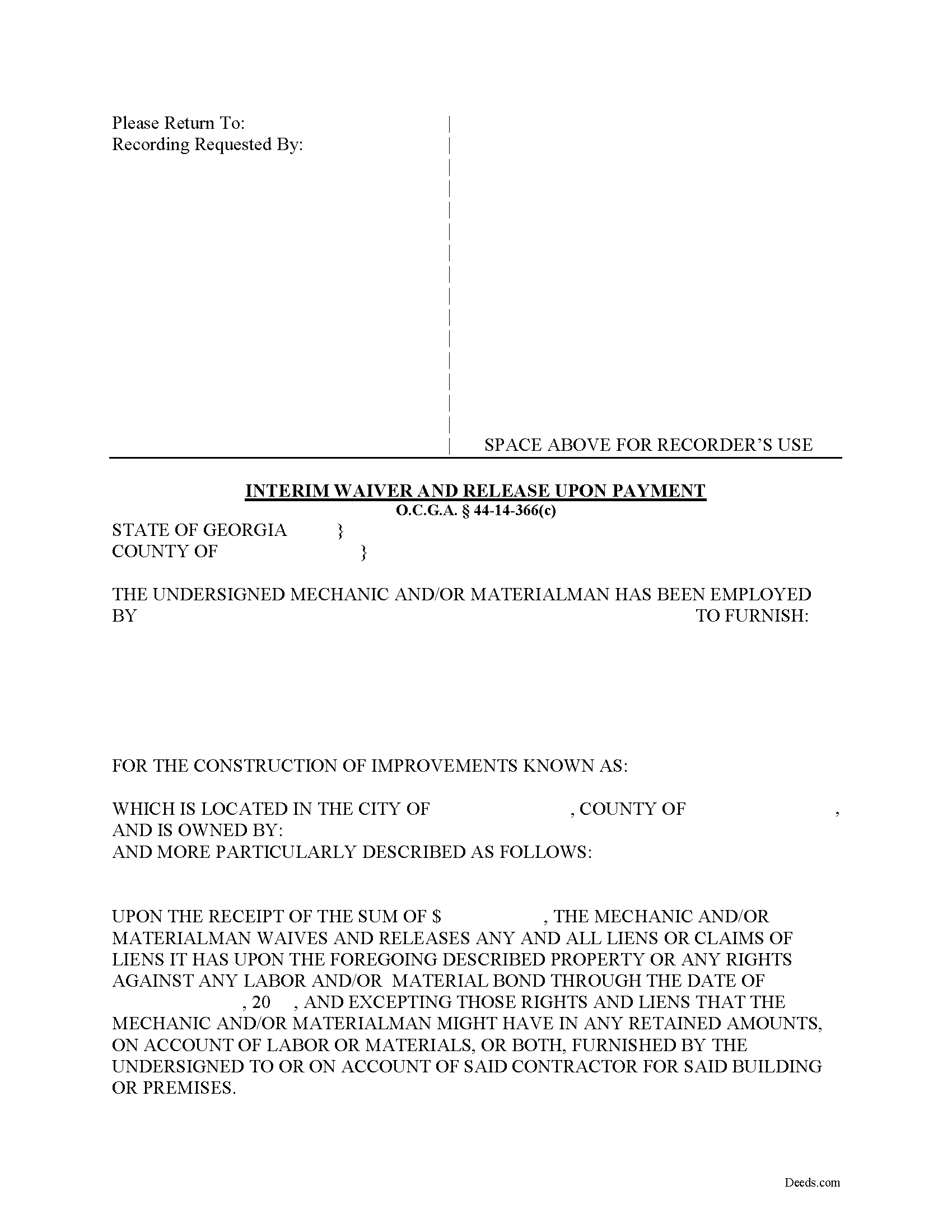
Lien waivers are recorded documents used to inform a property owner and any other interested parties that the person or firm with a potential mechanic's lien right is giving up the right to file that lien in exchange for full or partial payment. Use these documents carefully, because the right to a mechanic's lien is regarded as sacred in the realm on the construction world. Unlike most other states, Georgia takes a different approach to its lien waivers, declaring them void unless payment has been received. O.C.G.A. 44-14-366(b).
Georgia recognizes two major types of waivers: The Interim Waiver and Release upon Payment and the Waiver and Release upon Final Payment. O.C.G.A. 44-14-366. These two waivers also fit into the minor categories of being conditioned or not conditioned on actual receipt of payment (included a cleared check). The latter categories can have a tremendous effect on lien rights, as sending an unconditional waiver will waive the right to a lien regardless of confirmed payment.
In addition to requiring payment first, Georgia law prohibits preliminary waivers of lien rights before beginning the work: A right to claim a lien or to claim upon a bond may not b... More Information about the Georgia Interim Lien Waiver and Release
Affidavit of Non Payment
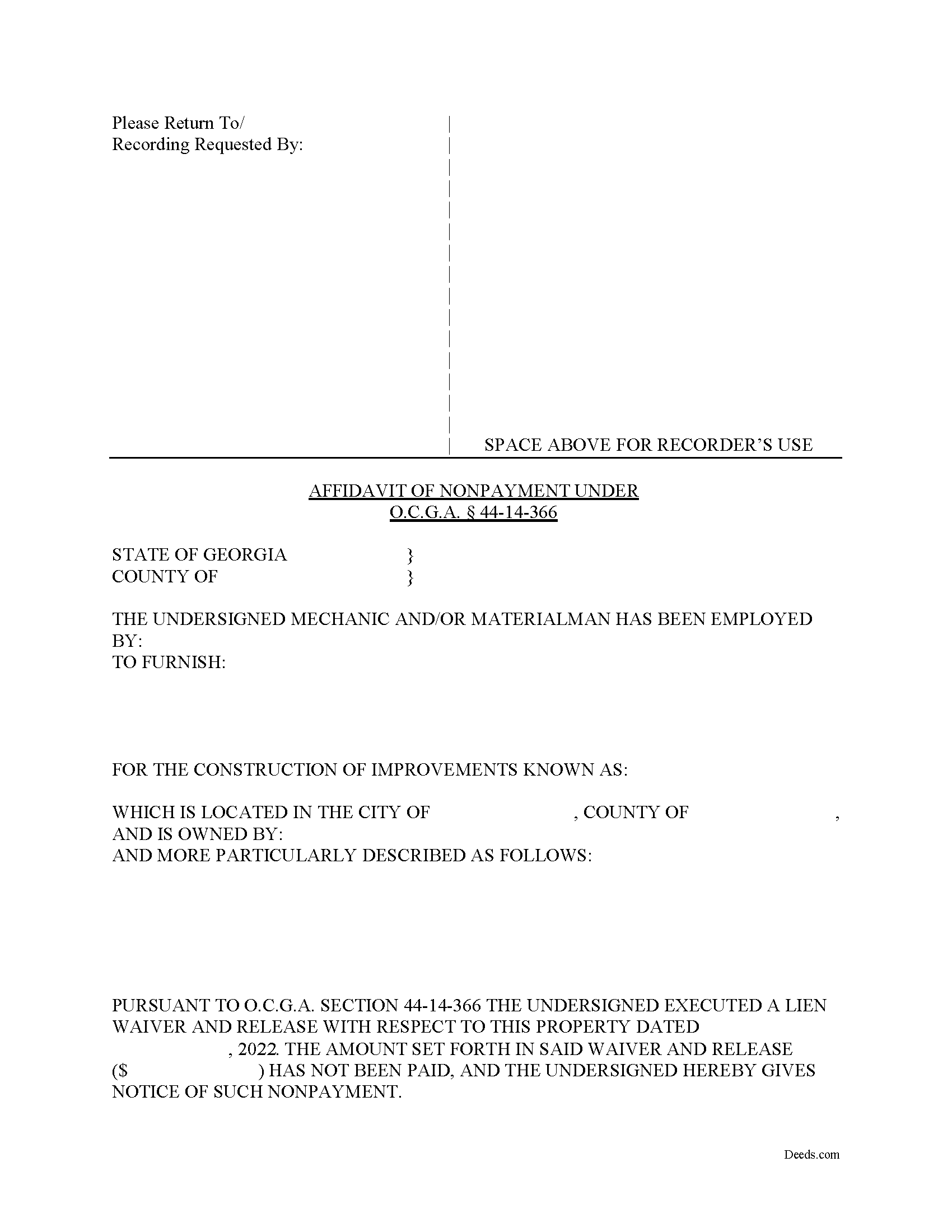
What happens if a contractor records a lien waiver, but the owner never pays the bill?
Best practices dictate that lien claimants should only grant waivers when payment can be verified. Even so, some claimants still choose to execute a waiver before that time. Unlike many other states, Georgia law provides an avenue for recourse: the Affidavit of Non-Payment. An affidavit of non-payment is a sworn statement filed with the county recorder after a lien waiver has already been filed but no payment was ever received.
When executed, a waiver and release of lien is considered binding against the claimant for all purposes, subject only to payment in full of the amount set forth in the waiver and release. 44-14-366(f)(1). This means if payment is never received, the waiver is considered ineffective. Note that, in order to declare the waiver void, the claimant must file an affidavit of non-payment.
An affidavit of non-payment identifies the parties, the nature of work and materials provided, the location of the improvements, the amount unpaid, and the recording information for the waiver. The affiant/claimant signs the document in front of two witnesses, one of whom must be a no... More Information about the Georgia Affidavit of Non Payment
Final Lien Waiver and Release
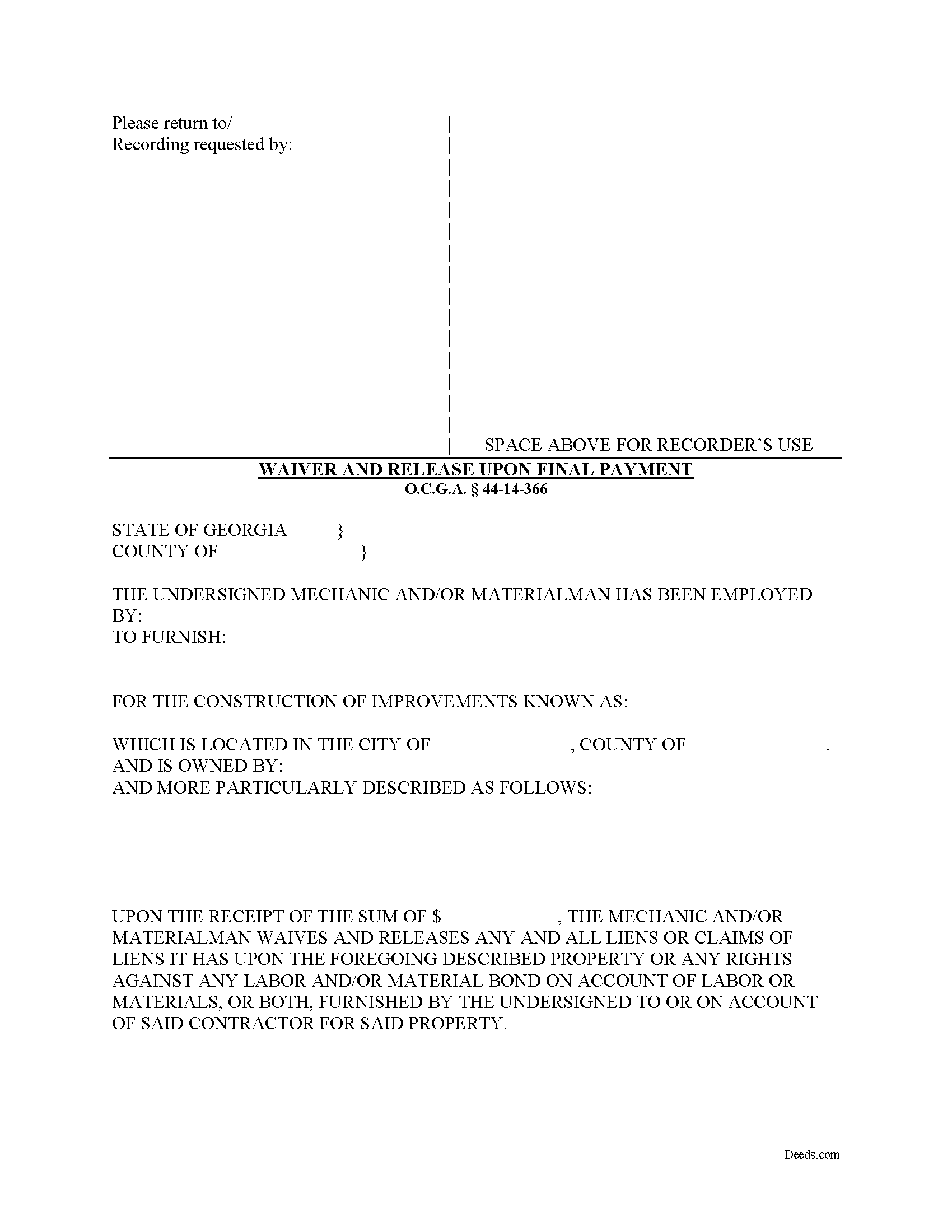
Lien waivers are recorded documents used to inform a property owner and any other interested parties that the person or firm with a potential mechanic's lien right is giving up the right to file that lien in exchange for full or partial payment. Use these documents carefully, because the right to a mechanic's lien is regarded as sacred in the realm on the construction world. Unlike most other states, Georgia takes a different approach to its lien waivers, declaring them void unless payment has been received. O.C.G.A. 44-14-366(b).
Georgia recognizes two major types of waivers: The Interim Waiver and Release upon Payment and the Waiver and Release upon Final Payment. O.C.G.A. 44-14-366. These two waivers also fit into the minor categories of being conditioned or not conditioned on actual receipt of payment (included a cleared check). The latter categories can have a tremendous effect on lien rights, as sending an unconditional waiver will waive the right to a lien regardless of confirmed payment.
In addition to requiring payment first, Georgia law prohibits preliminary waivers of lien rights before beginning the work: A right to claim a lien or to claim upon a bond may not b... More Information about the Georgia Final Lien Waiver and Release
Release of Claim of Lien
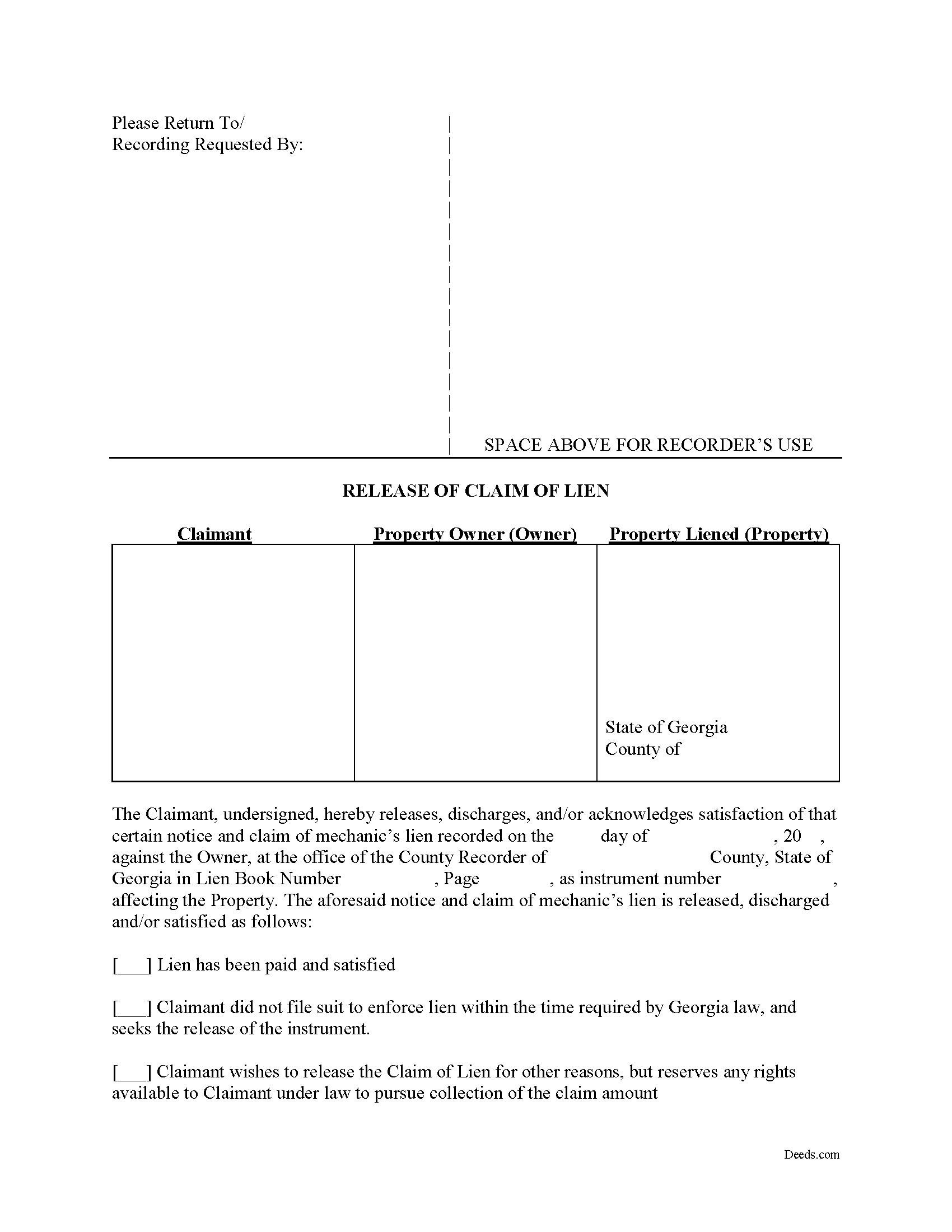
Cancelling a Georgia Mechanic's Lien After Payment
To dissolve previously filed mechanic's lien claims, claimants must file a Release of Claim of Lien. Construction liens must be canceled once payment has been received, the lien expires, or for any other reason. The lien release must be filed with the county recorder to cancel the previously filed lien instrument. The lien release is different than a lien waiver because it discharges an already filed lien, while a waiver surrenders the right to file one in the first place.
A Release form contains the following information: 1) lien claimant's name and address; 2) property owner's name and address; 3) address of the subject property; 4) date the lien was recorded; 5) the book number, page number, and instrument number as indexed by the county; and 6) reason for cancellation (lien has been paid, expired, or any other reason for discharge). The Release must be signed in front of a notary public who then signs as a notary and/or affixes his or her seal.
This article is provided for informational purposes only and does not constitute legal advice. Please speak with an attorney regarding releases or any other issues related to li... More Information about the Georgia Release of Claim of Lien
Specific Power of Attorney for the Purchase of Property
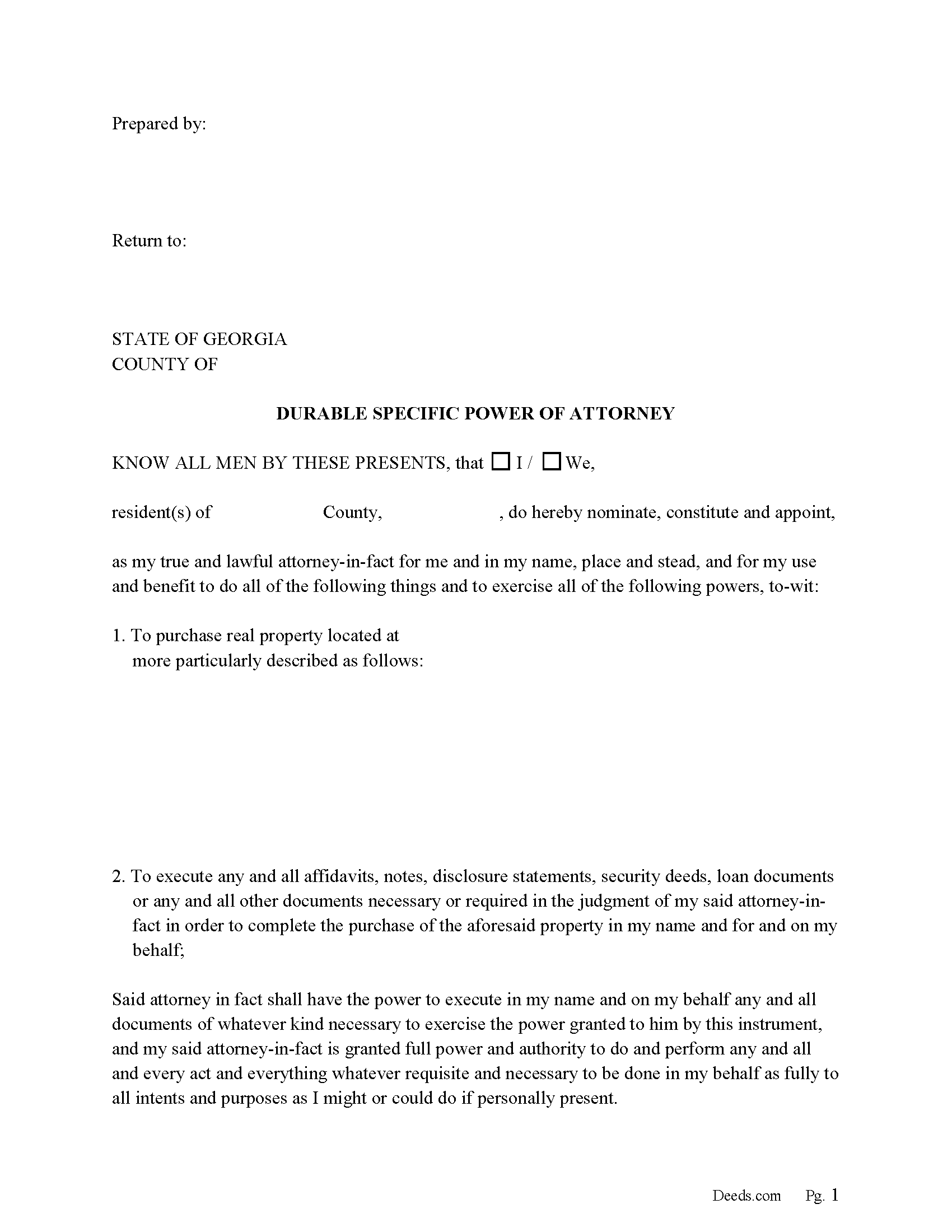
This is a Georgia Durable Specific Power of Attorney for the purchase of real property located in Georgia.
The Principal appoints an Attorney-in-Fact / Agent and empowers him/her to execute any and all affidavits, notes, disclosure statements, security deeds, loan documents or any and all other documents necessary or required in the judgment of your agent in order to complete the purchase of a specific property in your name and for and on your behalf.
This power of Attorney is durable and will not terminate upon the disability of the principal(s).
It expires on a future date that is provided by the principal, or by written notification.
Since this Power of Attorney is transaction specific, it is exempt from the Georgia Uniform Power of Attorney Act as per statute
10-6B-3.
(a) This chapter shall apply to all powers of attorney except:
(5) Transaction specific powers of attorney, including, but not limited to, powers of attorney under Chapter 6 of this title
(Georgia Specific POA for Purchase Package includes form, guidelines, and completed example) For use in Georgia Only.
... More Information about the Georgia Specific Power of Attorney for the Purchase of Property
Specific Power of Attorney for the Sale of Property
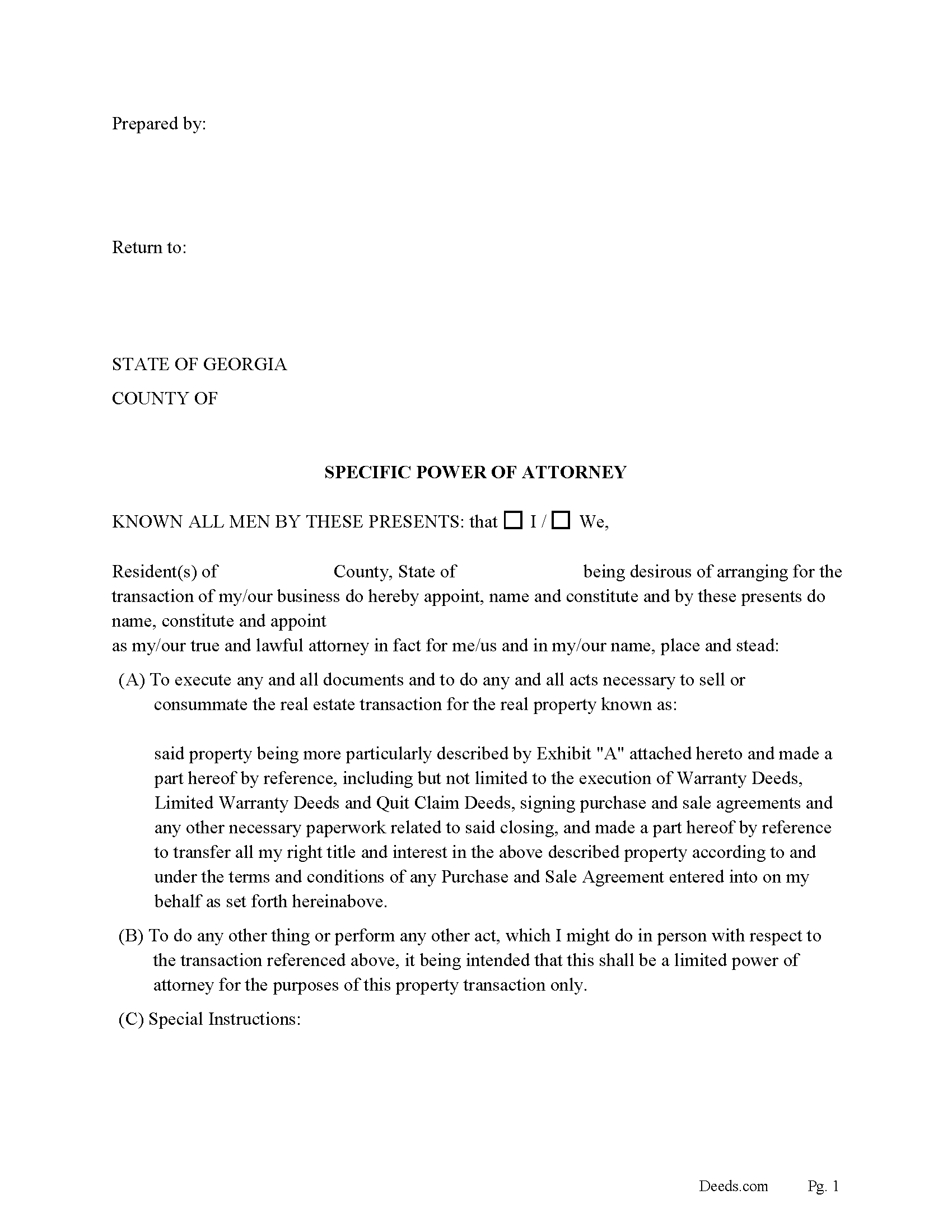
In this form the principle (whether a resident of Georgia or not) appoints an agent to sell their Georgia property. The agent has the power to execute any and all documents and to do any and all acts necessary to sell or consummate the real estate transaction for a specific real property, including but not limited to the execution of Warranty Deeds, Limited Warranty Deeds and Quit Claim Deeds, signing purchase and sale agreements and any other necessary paperwork related to said closing and to do any other thing or perform any other act, in which the principal might do in person with respect to the transaction referenced, it being intended that this shall be a limited power of attorney for the purposes of this property transaction only. There is a "special instructions" section where the principal can further limit or define the agent's powers. This power of attorney is durable and terminates on a future date provided by the principle or by a written notification.
(Georgia Specific POA for Sale Package includes form, guidelines, and completed example) For use in Georgia Only.
... More Information about the Georgia Specific Power of Attorney for the Sale of Property
Statutory Power of Attorney
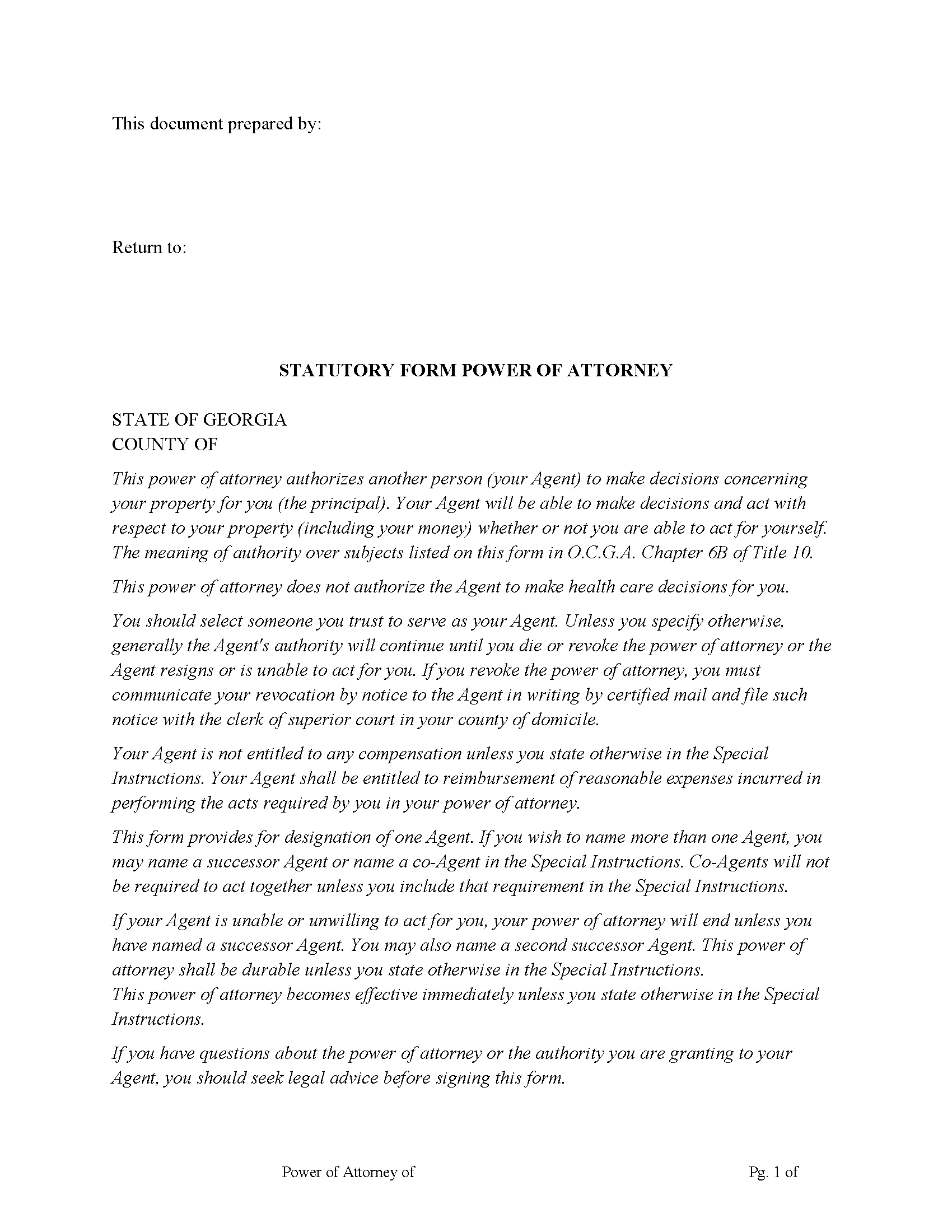
Georgia Statutory Form cited under the ("Uniform Power of Attorney Act.") ( 10-6B-1) fully formatted for recording, includes an addendum page to add real property descriptions.
(This power of attorney is durable) unless you expressly provide in the special instructions section that is not. ["Durable" means NOT terminated by the principal's incapacity.] (10-6B-4) [ 10-6B-2 (2)]
In this power of attorney, the principal appoints Agent(s), has the option of appointing Successor Agent(s) and Second Successor Agent(s).
10-6B-11 (a) A principal may designate two or more persons to act as coagents. Unless the power of attorney otherwise provides, coagents shall exercise their authority independently.
10-6B-11 (b) (1) A principal may designate one or more successor agents to act if an agent resigns, dies, becomes incapacitated, is no longer qualified to serve, has declined to serve, or dies. A principal may grant authority to designate one or more successor agents to an agent or other person designated by name, office, or function. Unless the power of attorney otherwise provides, a successor agent shall:
General authority, the Principal may grant any or all of these subjects, ... More Information about the Georgia Statutory Power of Attorney
Deed to Secure Debt and Promissory Note
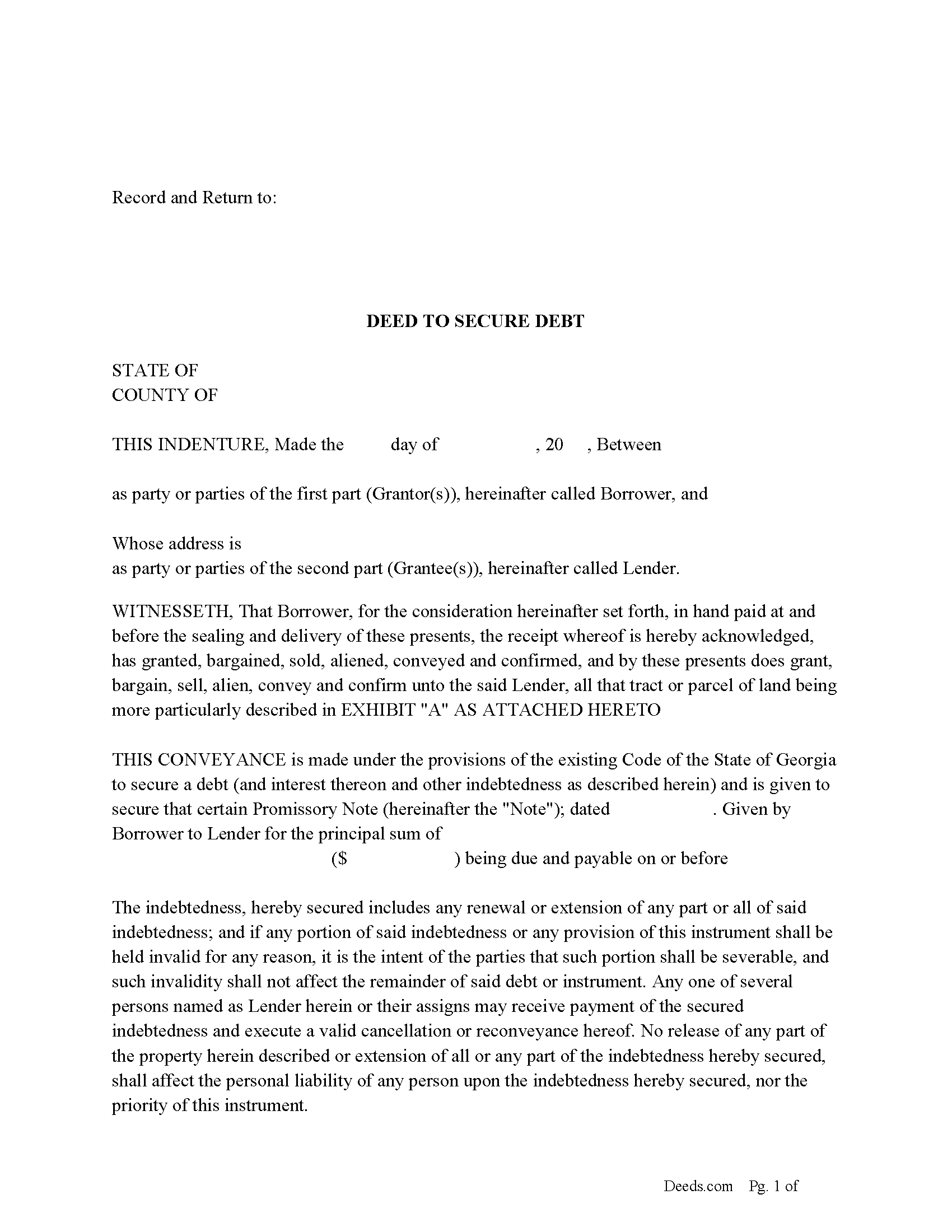
A "Deed to Secure Debt" often called a "Security Deed" that is protected by a "Promissory Note" is the preferred method of financing by Lenders in Georgia. Foreclosures can be done non-judicially saving time and expense. It being intended by the parties that this document shall operate as a deed, not as a mortgage and is made under those provisions of O.C.G.A. Sections 44-14-60 through 44-14-85 to secure the payment of Indebtedness.
There are two parties in this instrument.
"Borrower" means a person who has secured an indebtedness with a security interest in real property or a person who has taken an interest in real property subject to an outstanding security interest in the real property and has notified the holder of the security interest that he has taken the real property and assumed the indebtedness secured by the real property. (Section 44-14-5)(1)
"Lender" means a person who has a security interest in real property, which interest is evidenced by a security deed, a mortgage, a trust deed, a bond for title, or other security document granting a security interest in real property to secure an indebtedness owed to the lender. (Section 44-14-5)(2)
All transfers of dee... More Information about the Georgia Deed to Secure Debt and Promissory Note
Assignment of Security Deed
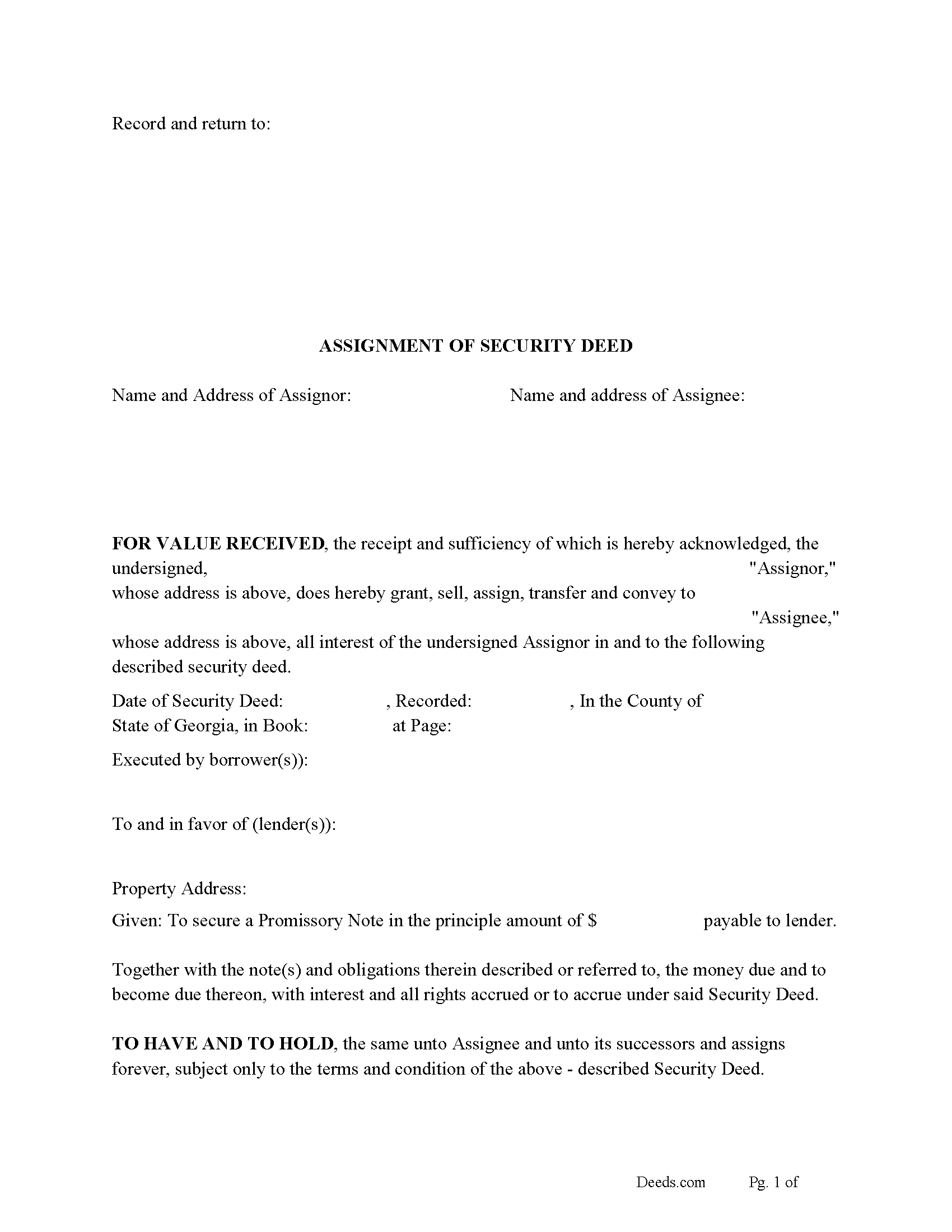
The Current holder of the Security Deed uses an "Assignment of Security Deed" to transfer the instrument to another party. This is typically done when the Security Deed has been sold, this allows the new lender to collect payments on the debt.
Georgia Statute: 44-14-64
(g) A transfer of a deed to secure debt shall not be recorded unless it includes the mailing address of the last transferee thereof. Failure to comply with this provision shall not be a defense to any foreclosure or grounds to set aside any foreclosure of any deed to secure debt.
Current Borrowers must be notified of the assignment. Notification consists of contact information of the new creditor, recording dates, recording instrument numbers, changes in loan, etc. Included are "Notice of Assignment of Security Deed" forms.
The Truth and lending act requires that borrowers be notified when their Security Deed has been sold, transferred, or assigned to a new creditor. Generally, within 30 days to avoid up to $2,000.00 in statutory damages, plus reasonable attorney's fees. Systematic violations can reach up $500,000.00.
(Georgia Assignment of Security Deed Package includes forms, guidelines, and complete... More Information about the Georgia Assignment of Security Deed
Cancellation of Security Deed
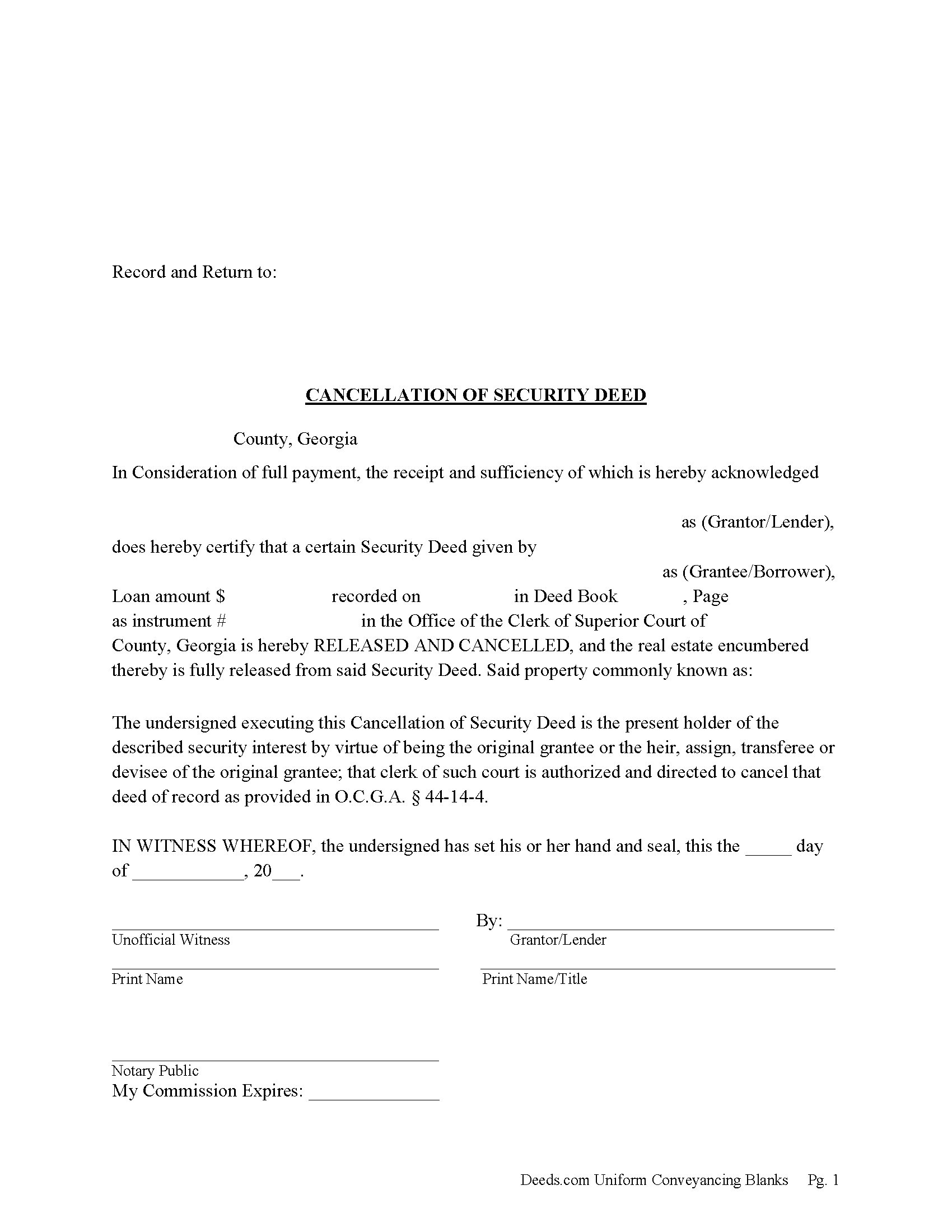
Current Lender, holder of the Promissory Note uses this form to cancel a Georgia "Security Deed" (also known as a "Deed to Secure Debt", "Loan Deed" or "Warranty Deed to Secure Debt") when it has been satisfied/paid in full. Record this form with the Clerk of the Superior Court in which the Security Instrument was recorded, the same county that the property lies in. (The clerk shall index and record, in the same manner as the original mortgage instrument is recorded, the canceled and satisfied mortgage instrument or such portion thereof as bears the order of the mortgagee or transferee directing that the mortgage be canceled, together with any order of the mortgagee or transferee directing that the mortgage be canceled. The clerk shall show on the index of the cancellation and on the cancellation document the deed book and page number where the original mortgage instrument is recorded.) (Section 44-14-4)
In general, the Lender has 60 days from satisfaction, to release the Security Deed before he/she becomes liable for damages. See Georgia Code Section 44-14-3
(Georgia Cancellation of Security Deed Package includes form, guidelines, and completed example)For use in Georgia Only.... More Information about the Georgia Cancellation of Security Deed
Certificate of Trust
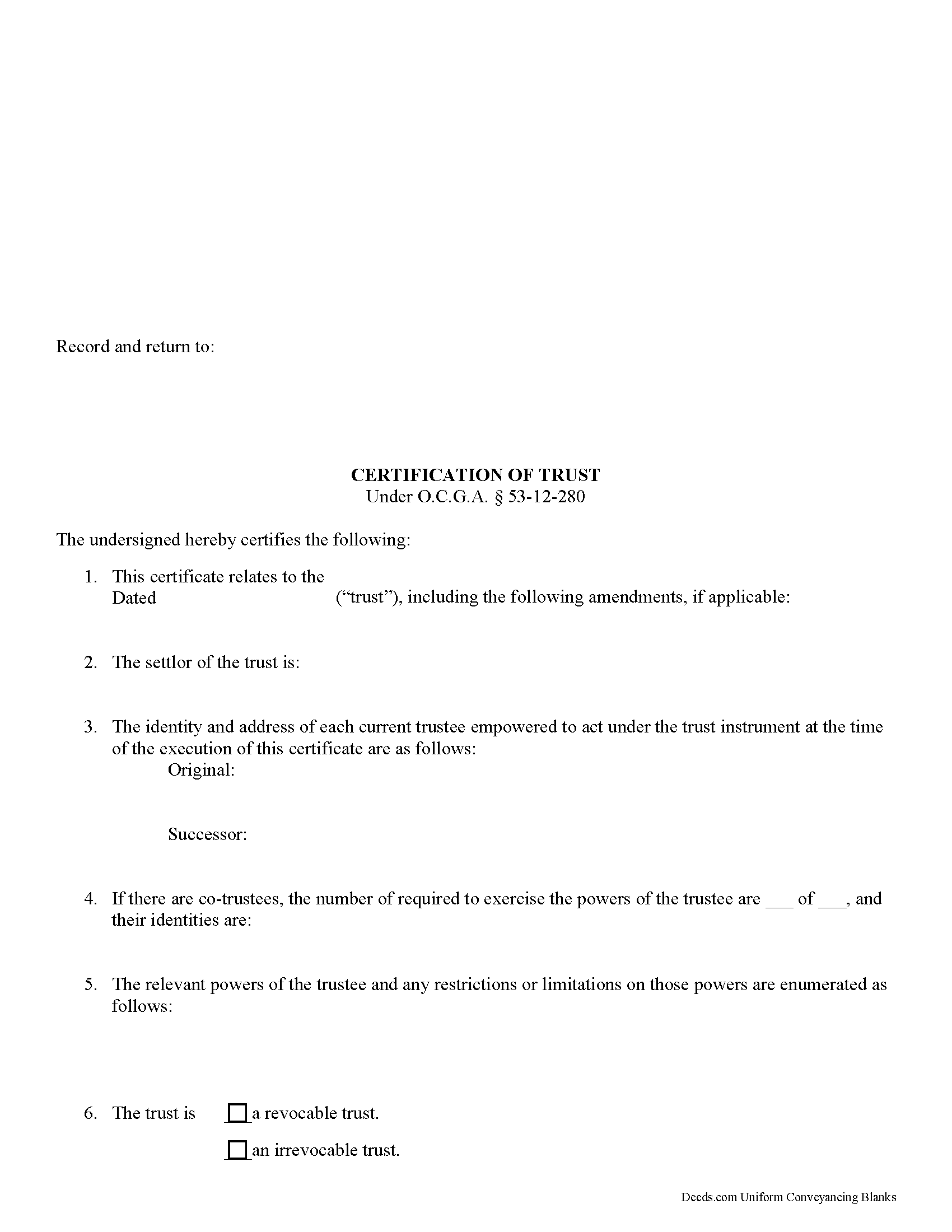
Georgia Certification of Trust
Under O.C.G.A. 53-12-280, a certification of trust is the document a trustee uses to establish the existence of trust provisions. The trustee furnishes the certificate to a party other than a trust beneficiary (someone who has a beneficial interest in the trust) in lieu of providing a copy of the full trust instrument. The certificate's purpose is to verify the trust's existence and the trustee's authority to act under the trust.
In trusts affecting real property, the trustee is the person who holds legal title to the real property ( 53-12-2(16)). The trustee's powers are established in the trust instrument, which is executed by a settlor in the creation of a trust.
The certificate contains only the essential information about a trust, including the name and date of the trust and identities of the settlor and acting trustees, as well as any successor trustees. The identities of those having a beneficial interest in the trust remain undisclosed. In addition, the certificate states how trust property should be titled, and whether or not the settlor has the power to revoke the trust. The trustee's powers relevant to the management of trust pr... More Information about the Georgia Certificate of Trust
Lis Pendens
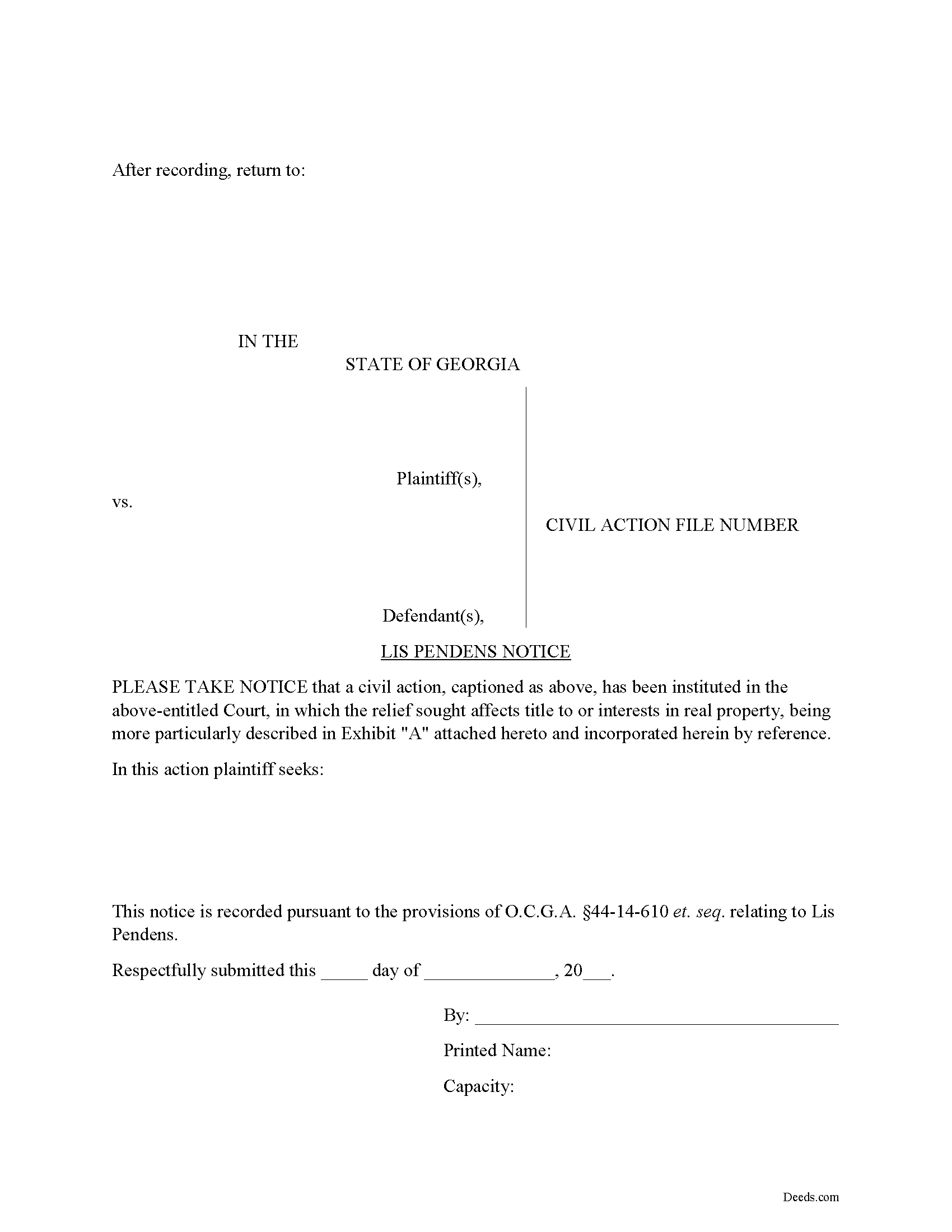
Lis Pendens is Latin for "litigation pending". Think of Lis Pendens as "notice of lawsuit". Once recorded this gives notice to the world that there is litigation pending over a parcel of real property. A buyer would be held subject to the outcome of the litigation. This greatly discourages any transfer of title until litigation is resolved. Common uses of a Lis Pendens are: Quit Title Action, Mechanic's Lien, Foreclosure, and part of a divorce proceeding.
A Georgia Lis Pendens requires:
-the names of the parties (Our form allows adequate space for multiple plaintiffs and defendants)
-the time of the institution of the action (time and date stamped upon recordation)
-the name of the court in which it is pending
-a description of the real property involved
-a statement of the relief sought regarding the property.
O.C.G.A.44-14-610. Necessity of recordation for operation of lis pendens as to real property
No action, whether seeking legal or equitable relief or both, as to real property in this state shall operate as a lis pendens as to any such real property involved therein until there shall have been filed in the office of the clerk of the superior court... More Information about the Georgia Lis Pendens
Lis Pendens Discharge
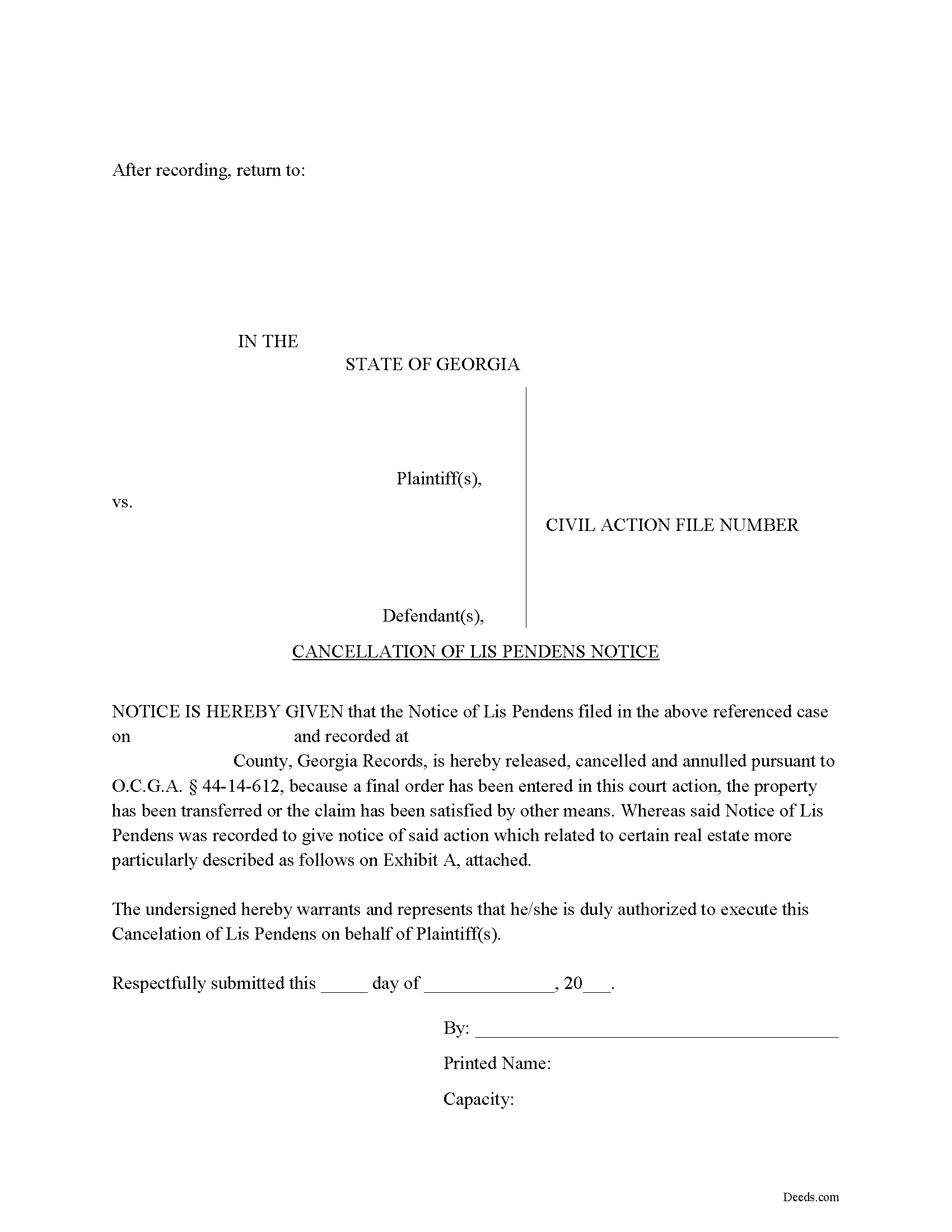
When a Lis Pendens is filed it gives constructive notice that a case in pending on a parcel of real property. When a case has been resolved or abandoned it is prudent to file a Cancellation of Lis Pendens. If the sale of a property is held up because the plaintiff didn't file a Cancellation Notice, he/she could be held liable for losses and damages. Once the Cancellation of Service form has been filed, it is important to notify the defendants and interested parties, that such action has been taken. We include a Certificate of Certification form to provide documentation of service provided. Often in a civil action involving real property, there are multiple parties because of lien holders, spouses, easement rights, etc. This form provides space for such.
9-11-5. Service and filing of pleadings subsequent to the original complaint and other papers
(a) Service -- When required. Except as otherwise provided in this chapter, every order required by its terms to be served, every pleading subsequent to the original complaint unless the court otherwise orders because of numerous defendants, every written motion other than one which may be heard ex parte, and every written notice, appe... More Information about the Georgia Lis Pendens Discharge
Disclaimer of Interest
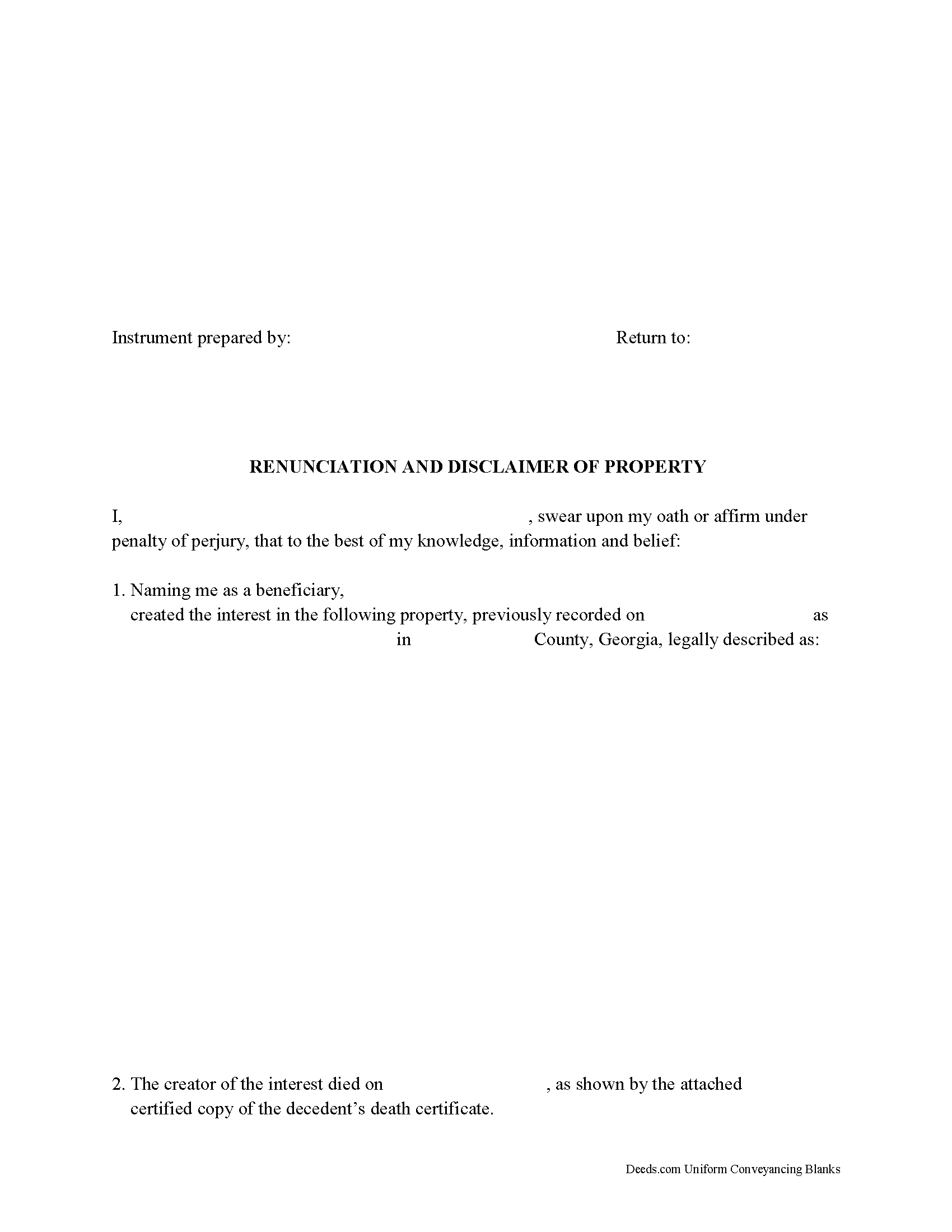
Georgia Disclaimer/Renunciation of Property
A beneficiary of an interest in property in Georgia can disclaim and renounce all or part of a bequeathed interest in, or power over, that property under O.C.G.A. 53-1-20, as long as it has not been accepted through actions that indicate ownership or through a written waiver of the right to disclaim (53-1-20 (g)).
The written disclaimer must identify the creator of the interest, provide a description of the disclaimed interest, a declaration of the disclaimer and its extent, and it must be signed by the person making the renunciation (53-1-20 (c)).
The disclaimer must be filed, recorded and/or delivered pursuant to 53-1-20 (d) as follows:
* It must be received by the transferor, his legal representative, or the current holder of title within nine months of the transfer. This is consistent with the Internal Revenue Code Section 2518.
* It also may be filed with the probate court in the county where the estate proceedings are pending or could be commenced.
* In the case of real property, the renunciation may be recorded with the clerk of the superior court.
A disclaimer relates back to the death of the decedent or to the... More Information about the Georgia Disclaimer of Interest